Star Trek: TNG’s Marina Sirtis & Counselor Troi Explained
- Marina Sirtis has portrayed Deanna Troi in multiple Star Trek shows and continues to be a beloved character, especially in her role in Picard season 3 where she becomes a surprise hero and plays a pivotal role in locating trapped crew members. Marina Sirtis plays Counselor Deanna Troi in Star Trek: The Next Generation and Star Trek: Picard. Deanna Troi served as ship's counselor on the USS Enterprise-D under the command of Captain Jean-Luc Picard (Patrick Stewart). As the ship's counselor, Troi became the heart of TNG, often helping people find connections and work through their various problems. Although the writers of TNG sometimes seemed unsure of what to do with Deanna as a character, Counselor Troi proved to be a great counselor and an invaluable addition to the crew of the Enterprise-D.

tag_startrek--> -->相關文章 -->
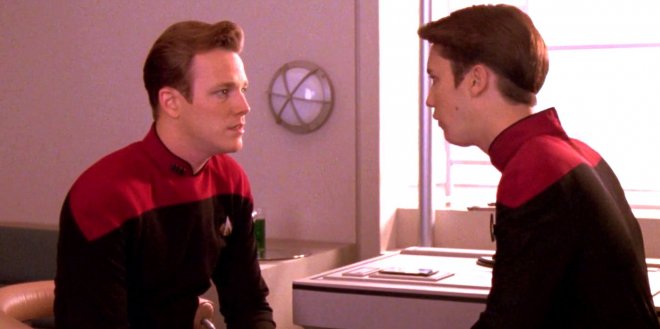
- More to Explore
- Series & Movies
Published Mar 29, 2023
The Radical Empathy of Deanna Troi
For too long women were written as overly emotional, with reactions that would devour and destroy them. Then came Deanna Troi.

StarTrek.com
Of all Star Trek: The Next Generation ’s top-notch, all-thriller, no-filler cast of characters, Deanna Troi is perhaps one of the more under-appreciated, despite appearing in all seven seasons, the TNG films, and even a few Star Trek: Voyager episodes. Though she was omnipresent through much of the series, the focus seldom fell on her. Yet, when it did, her cultivation of radical empathy towards others made for some of the most interesting episodes in Star Trek canon.
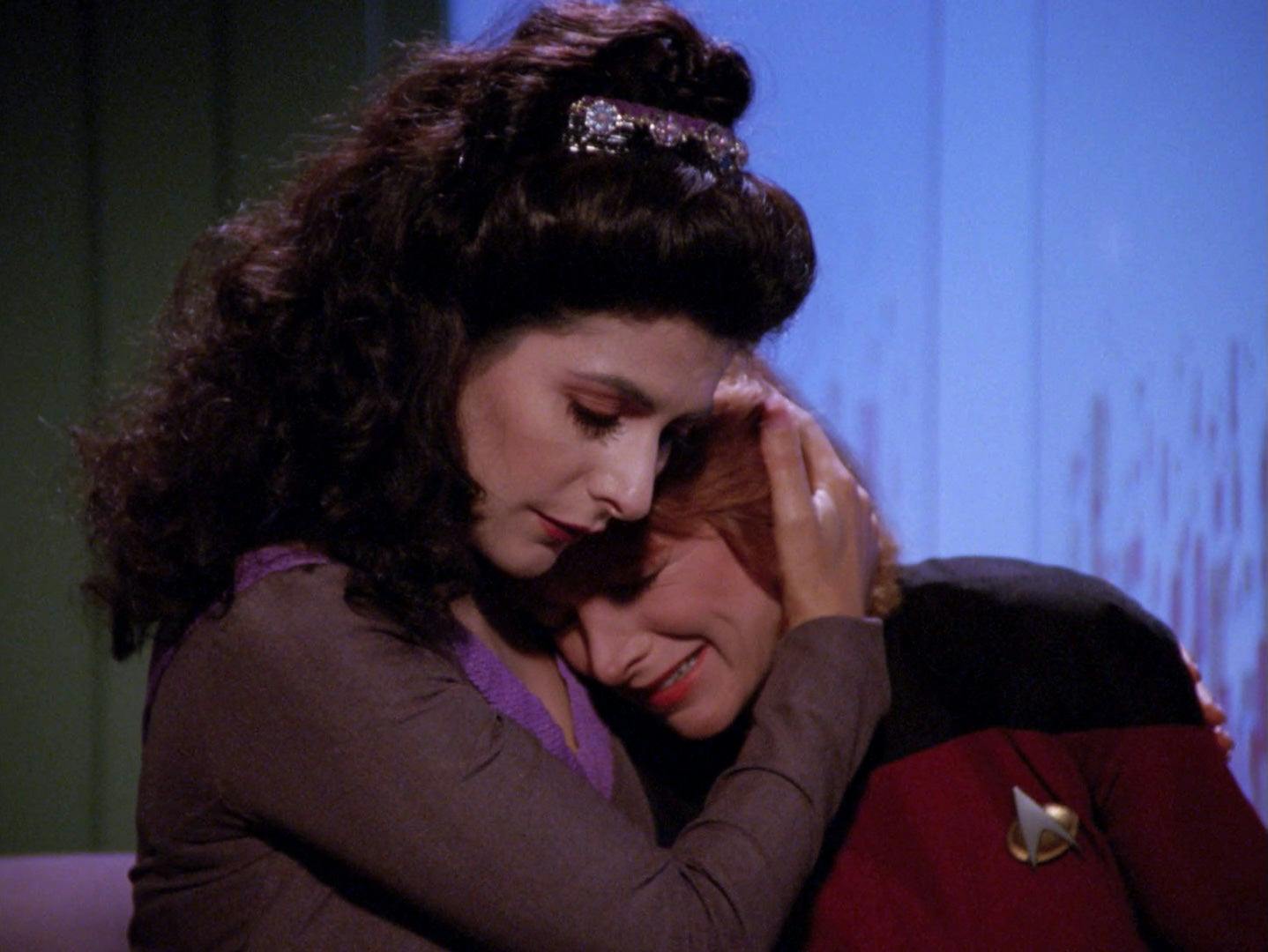
Powerful women who were able to maintain their power and remain at the forefront of genre television were few and far between in decades past. But Troi, a Betazoid empath so powerful that her range extends beyond the bounds of the ship she travels on, shows that people who are guided by their hearts actually have a bit of an edge in life. In a lot of fiction, women’s emotions devour and destroy them. And empaths and telepaths in fiction, especially, are often portrayed like Raven from the Teen Titans or Jean Grey of the X-Men, both of whom undergo extensive trauma, are incredibly unstable, and prone to losing control or murdering their teammates. That’s never the case with Troi.
Yet, it is in the episodes in which Troi struggles and shows her dark side that we begin to understand who she is and why her journey is so important among a cast of important stories. In “ The Loss ,” we see Troi losing her powers in the first few moments of the episode. Her bad side is on full display, but she’s still just fascinating despite generally acting like an unruly teenager for much of her time on-screen. This episode showed a tremendous amount of growth by targeting and suspending the thing that Deanna relies on for everything — her intuition. By inhibiting her ability to empathize, the threat of the week showed us how the generally brave and calm Deanna deals without her own supreme inner harmony. The answer is, not great , but isn’t that more relatable? Much of Deanna’s life is tied up in her level of pride in her work and feeling like her work was to be discontinued shattered her (for one episode).
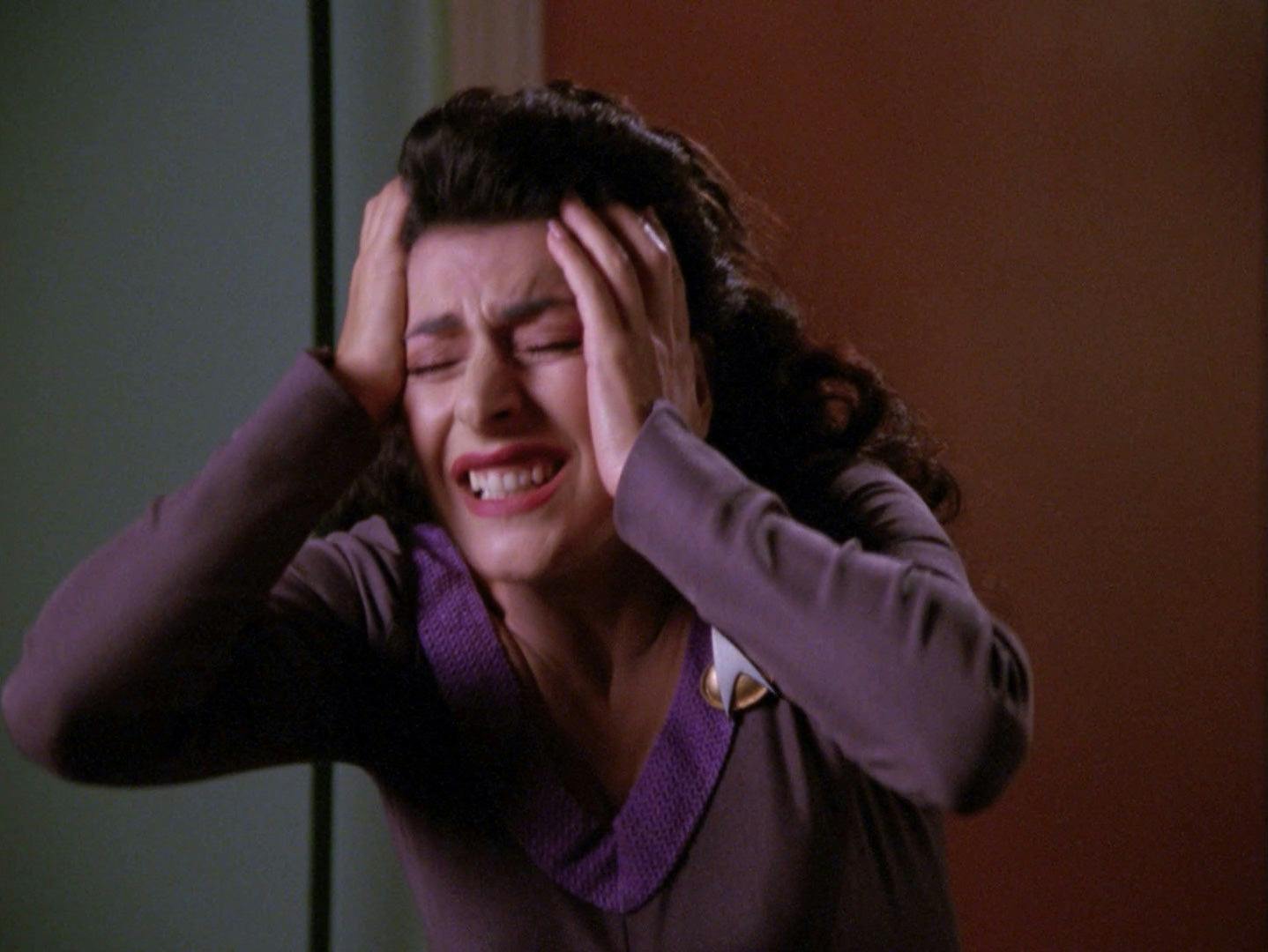
Her self-loathing towards her human heritage comes into play as Riker calls her out for secretly feeling like humans were in some way less perceptive and even somehow stunted. He observes that her edge of control, or even an underlying sense of superiority, is gone without her empathetic senses. Deanna continues to push him away, and the generally brash Riker shows a deep patience and acceptance of her struggle. He’s able to look past her words and see how scared she is, and he refuses to let her go through it alone.
We see Troi’s full temper here for maybe the first time. She’s convinced everyone is condescending to her and is completely unable to deal with that emotionally. The episode demonstrates that Troi’s sense of self-awareness is so important to her that she is willing to walk away from everyone out of a refusal to become a burden for the Enterprise . She refuses to recognize her crewmates’ sympathy and instead views it as pity. The threat of dependency terrifies her, and this is where we start to understand a deep sense of personal responsibility in Troi that can easily pass the threshold of self-abuse. Though misguided and even somewhat sad, Deanna’s sense of pride and her struggle to reconcile it will stand out to a lot of people who hold themselves to a perfectionist extreme.
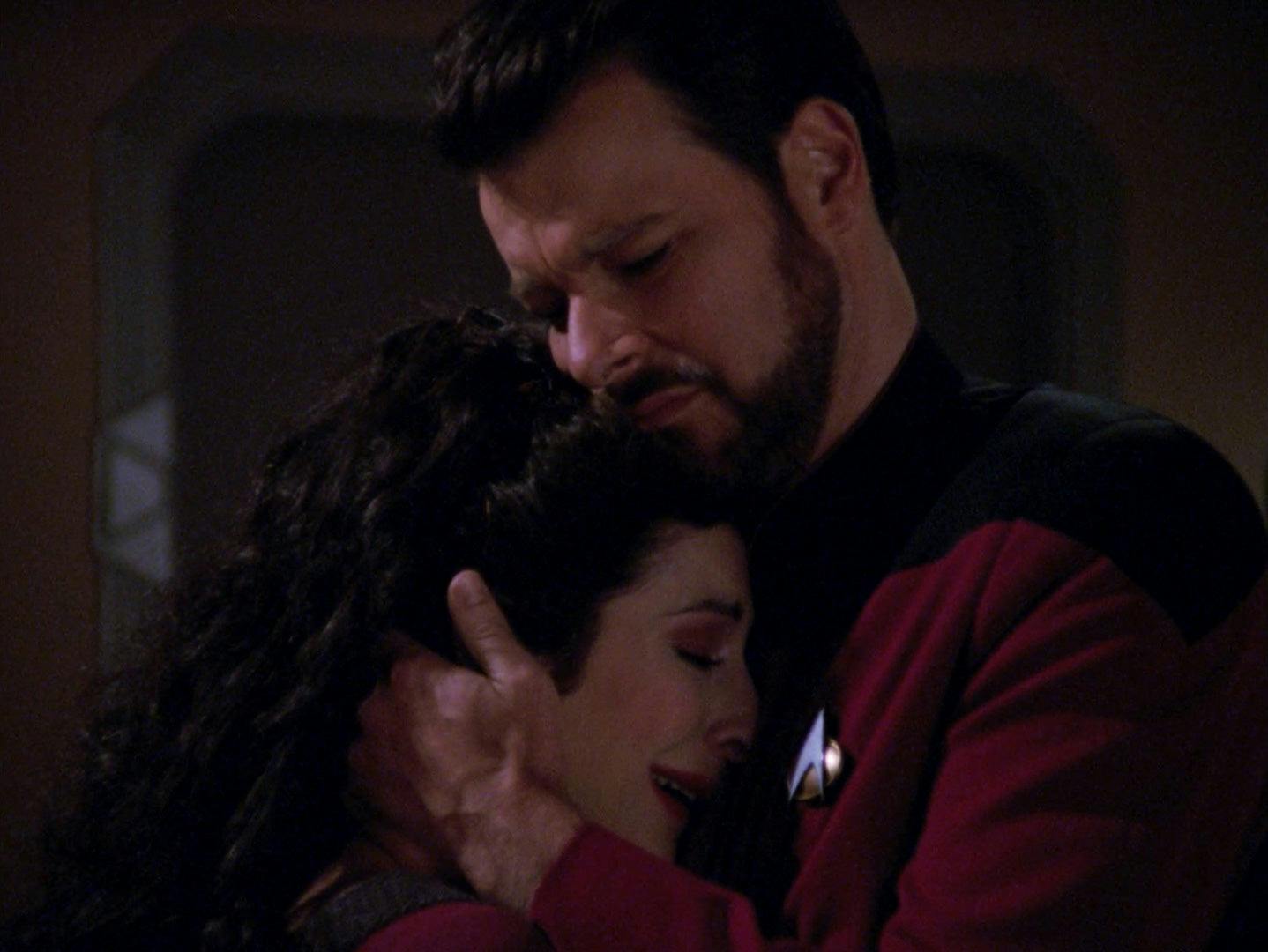
Troi is sharp with everyone in “The Loss.” She refuses to allow Picard to genuinely sympathize with her, instead shutting him down and accusing him of placating her. When Dr. Crusher is gentle and honest with Troi that she might not regain her empathy, Troi becomes annoyed and snaps at her. Crusher insists she doesn’t want to give Troi false hope, to which Troi sharply responds, “It’s just hope, Beverly, not false hope.” She repeatedly tells the people around her that they can’t hope to understand what she’s going through despite their active attempts to do so.
Though not always directed in the right places, Troi’s sharp sense of outrage is always lovely to see. For someone who prides herself on her ability to remain calm, she is still a flawed person. She gets mad, she loses patience, she condescends, and, maybe worst of all for a counselor, she sometimes calls people out on their feelings before they’re ready to talk about them. Yet, she’s also someone who really comes into her own as far as drawing boundaries goes. In a way, this all only makes Troi more relatable. Most intensely empathetic people struggle with boundaries throughout much of their early lives, but we always can, and often do, get better at developing those important parameters as we go along.
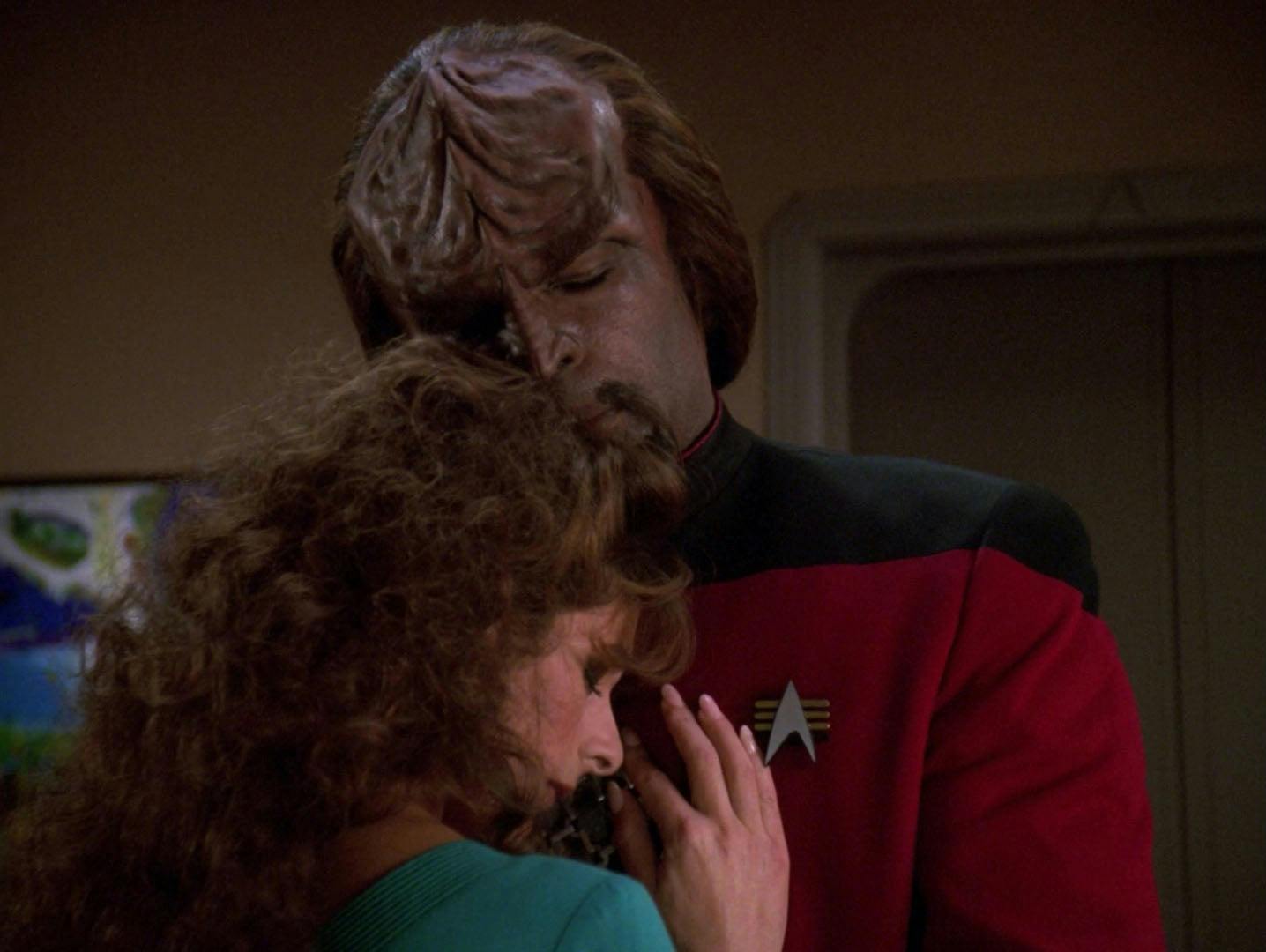
Troi’s often unacknowledged inner struggle is part of why her relationships with the rest of the crew are so fascinating. For instance, her relationship with Worf was one of the better parts of both of their character arcs. These are two people that, at first glance, would seem to have little in common with each other outside the Enterprise , but this is where we saw an emphasis on their substantial emotional common ground. Both are incredibly loyal, prideful, and easily angered, but both are also deeply gentle spirits that struggle with violence on a profound and often unspoken level. Though he isn’t always forthcoming, Worf is easily one of the most emotional people on the crew. Troi’s light pushing of Worf to be more open, honest, and communicative about his many feelings helped Worf. Meanwhile, his passion and sense of honor gave Troi the stable foundation she needed to express her interest in him. Though short-lived, this relationship was better than a lot of people give it credit for because it helped us see both characters through a new lens.
Even when platonic, Troi’s relationships are a shining part of TNG. Picard regularly depends on Troi and leans on her advice; throughout the series, she is one person who always challenges him. By forcing Picard to stay in touch with difficult-to-face feelings and getting him to confront things that he is instinctively prone to overlook, she is a major asset for the captain who is guided by a ceaseless inner certainty. In listening to Troi, Picard becomes a better, more compassionate commander. Meanwhile, her deeply felt interactions with the painfully intentional Crusher and her ability to meet Data and Geordi at their goofiest led to some of the best moments of the series. Troi is a character that improves the entire cast in often subtle ways.
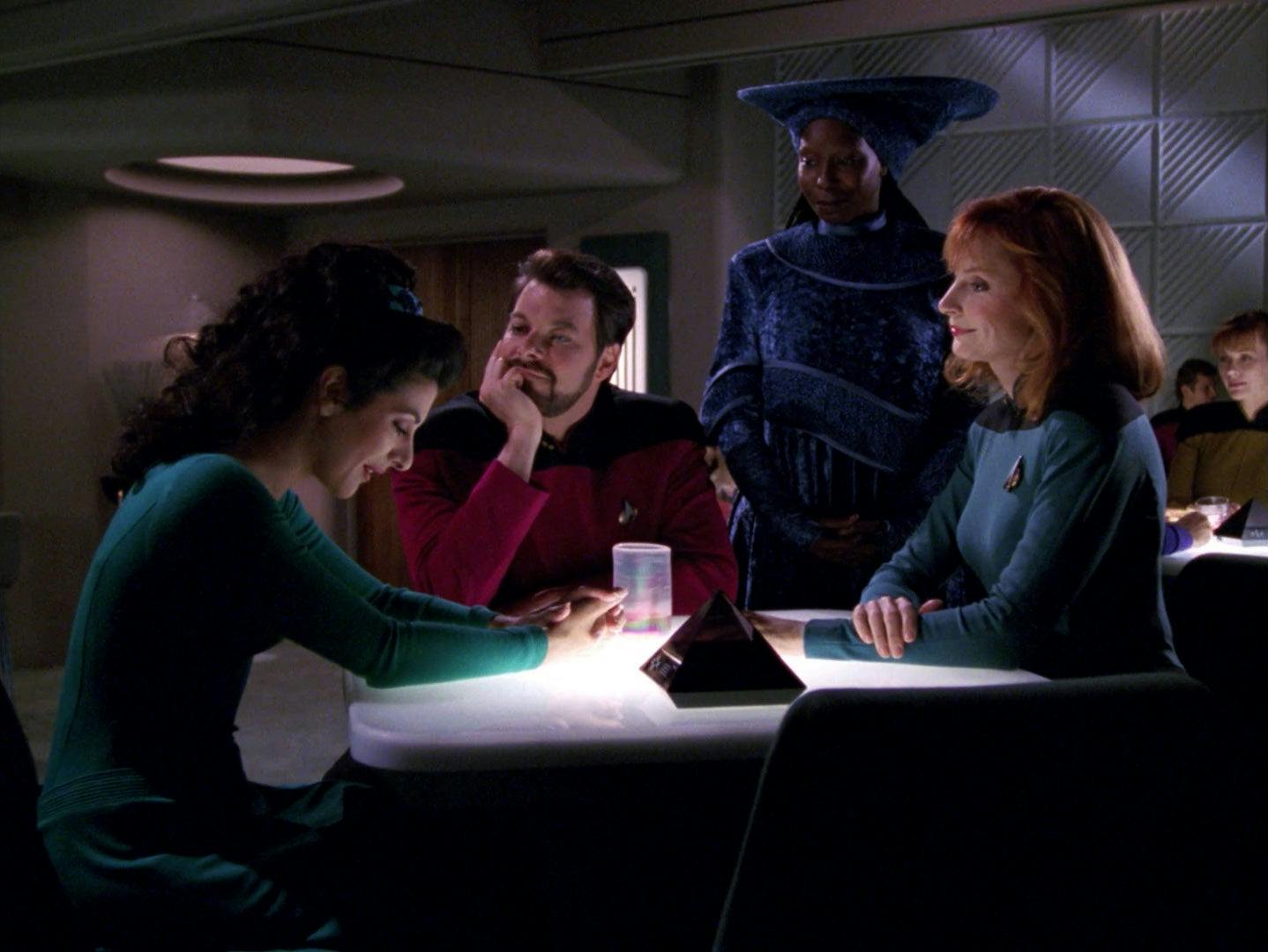
We live in a society that views compassion as a weakness, particularly feminine compassion. The message that to care is to give up your strength is instilled through media, culture, even in the mechanics of our very language. Allowing yourself to feel the world with one or two degrees less of a protective layer around your heart takes courage, and courage takes power. Like many highly sensitive people, Deanna Troi is regularly underestimated and her importance reduced. Through her patience and understanding, Troi insists that forcing yourself to view the world with empathy makes you a stronger person, not a weaker one.
This article was originally published on September 10, 2019.
Sara Century (she/her) is an artist, writer, and filmmaker who is obsessed with most things. She is good at speaking in public, volunteering her time to various causes, working for most hours of her waking life, and saying quotable things in casual conversation. Keep up with her at www.saracentury.com and on Twitter @saracentury.
Stay tuned to StarTrek.com for more details! And be sure to follow @StarTrek on Facebook , Twitter , and Instagram .
Get Updates By Email
What Happened To Star Trek's Counselor Troi?
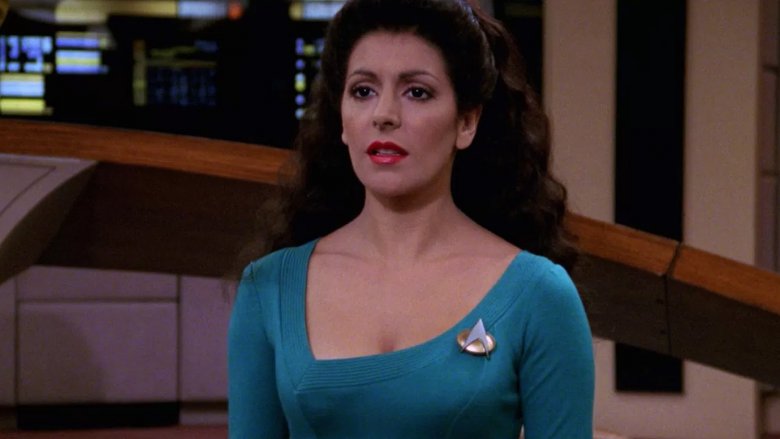
As Counselor Deanna Troi on the sci-fi TV series Star Trek: The Next Generation , British-American actor Marina Sirtis played one of the most iconic female characters in the Star Trek franchise. Although her role was originally slated to be cut after the show's first season , Sirtis managed to keep her job as Troi, appearing in 176 episodes from 1987 to 1994. Fans fell in love with the cerebral and compassionate empath, and Troi eventually became one of the show's most popular characters. But what has Marina Sirtis been up to since The Next Generation was canceled? Along with frequent appearances on the fan convention circuit, Sirtis still acts regularly. In fact, she's had roles in dozens of other films, TV shows, and video games over the last two decades. If you've been wondering whatever happened to Counselor Troi, then keep on reading to catch up with this talented actress and find out what she's up to today.
More Star Trek (1994-2017)
Although Star Trek: The Next Generation came to a close in 1994, that wasn't the end of Sirtis' work within the popular sci-fi franchise. She reprised her role as Counselor Troi in the feature films Star Trek: Generations (1994), Star Trek: First Contact (1996), Star Trek: Insurrection (1998), and Star Trek: Nemesis (2002) alongside much of the original ST:TNG cast. Deanna Troi also popped up in several other Star Trek productions, including three episodes of Star Trek: Voyager from 1999 to 2000, and also in the emotional 2005 series finale of Star Trek: Enterprise , which also featured her former co-stars Jonathan Frakes and Brent Spiner . Although the Enterprise finale marked her last appearance as Deanna Troi, Sirtis later returned to the Star Trek franchise yet again in a different role. You might recognize her as the voice of the Enterprise's computer in the fan-created web series Star Trek Continues from 2013 to 2017.
Gargoyles (1994-1996)
After The Next Generation , Marina Sirtis tried her hand at voice acting, joining the cast of the Disney animated series Gargoyles . From 1994 to 1996, Sirtis voiced Demona, the lead antagonist of the series and one of the show's most popular characters. Demona was originally pitched as the leader of the Gargoyles , but she was changed into a villain with a thirst for vengance against the humans that slaughtered her clan. According to Sirtis , she put a lot of thought into Demona's evil nature and hatred for humankind, because the gargoyle's anger came from "a real place of pain and betrayal." While many fans who approach Sirtis at conventions are fans of her work in both Star Trek and Gargoyles , she says that quite a few prefer Demona over the "passive" and "girly" Deanna. Sirtis wasn't the only TNG actor that ended up on Gargoyles ; some of her former co-stars also voiced characters on the show — including Jonathan Frakes as David Xanatos, Michael Dorn as Coldstone, and Brent Spiner as Puck.
More Voice Acting (1996-2017)
Once Sirtis proved her voice acting chops with her role on Gargoyles , other shows and video games were soon lining up to cast her in their projects. From 2011 to 2013, she provided the voice of antagonist "Queen Bee" and several other characters in the Cartoon Network animated series Young Justice , which adapts the stories of many young superheroes from the DC Universe. Sirtis has also lent her voice to a number of other animated characters, including delusional dog/goddess Samantha on Adventure Time , Cosma in OK K.O.! Let's Be Heroes , and other voices in episodes of Family Guy and The Cleveland Show . Along with these roles for television, Sirtis has also voiced characters in several video games, including as Deanna Troi in two Star Trek games and Family Guy: The Quest for Stuff , Matriarch Benezia in 2007's Mass Effect , and most recently as Elena Dragunova in 2014's XCOM 2: War of the Chosen .
The Outer Limits (1999)
After taking some away from traditional sci-fi with her role in Gargoyles and appearances in mystery-themed productions like Gadgetman and Diagnosis: Murder , Marina Sirtis returned to the science fiction genre with a role in the Showtime series The Outer Limits . In the 1999 episode " The Grell ," Sirtis played Olivia "Liv" Kohler, wife of High Secretary Paul Kohler (Ted Shackleford). After generations living as slaves, the alien Grell species rebel against their human masters. Paul and his family are caught in the crossfire when their plane is shot down by the rebels. But when their Grell slave Jesha shows loyalty to the Kohlers and their children instead of turning them over to the rebel leaders, Paul and Olivia are forced to rethink their bigoted worldview. This episode also has an interesting connection to Star Trek — after directing "The Grell," Jorge Montesi went on to direct 20 episodes of the sci-fi series Andromeda , which was produced by Gene Roddenberry's widow Majel Barrett-Roddenberry , who played Deanna Troi's mother Lwaxana Troi in The Next Generation .
Stargate SG-1 (2000)
In 2000, Marina Sirtis made an appearance in another popular science fiction franchise when she guest-starred as Dr. Svetlana Markov on the Showtime series Stargate SG-1 . In the episode " Watergate ," the SG-1 team is dispatched to Russia after Stargate Command learns that the Russians have set up their own Stargate Program. The Russian Stargate is "stuck" open on an aquatic planet, and Dr. Markov requests SG-1's assistance in shutting the gate. When they arrive, the SG-1 team find that much of the Russian Stargate personnel have been mysteriously killed, and they are unable to shut down the gate from the Earth side. After traveling through the gate in a mini-sub, Markov and the SG-1 team learn that the oceans covering the new planet are actually microscopic alien beings made of water vapor, who can "infect" and control other beings — like the commander of the Russian Stargate operation. Once they're discovered, the aliens retreat back through the gate and allow it to be closed it for good.
Casualty (2001)
In 2001, Marina Sirtis landed a role much closer to "home" when she appeared in an episode of the popular British hospital drama Casualty . In the episode " Something from the Heart ," she played MP Jane Taylor, a politician with strong and controversial opinions about the country's National Health Service. Taylor is having an affair in secret with businessman Mark Fletcher (Shaun Scott), which comes to light after she meets her lover at a hotel and he's gravely injured and trapped when a gas explosion rocks the building. Although she gives a false name while being treated at Holby City Hospital, Taylor's recent appearances in the news and her concern for Fletcher mean that her secret may not stay hidden for long — especially when a curious tabloid reporter starts snooping around. This wouldn't be the last time Sirtis appeared in a British hospital drama — seven years later, she guest-starred in a 2008 episode of the Casualty spinoff series Holby City .
Crash (2004)
Marina Sirtis picked up a minor role in the 2004 Academy Award-winning drama Crash , directed and co-written by Paul Haggis. Based on a real-life carjacking incident from Haggis' life, Crash follows the interweaving lives of several different people over the course of two days in Los Angeles, played by an ensemble cast that also included Sandra Bullock, Don Cheadle, Matt Dillon, Jennifer Esposito, William Fichtner, Brendan Fraser, Terrence Howard, Chris "Ludacris" Bridges, Thandie Newton, Michael Peña, and Ryan Phillippe. In Crash , Sirtis plays Shereen, the wife of distrustful and paranoid Persian shopkeeper Farhad (Shaun Toub). Sirtis doesn't have a lot of screen time in the film, but her scenes cause some important developments. After Shereen is accosted, Farhad and their daughter Dorri (Bahar Soomekh) buy a gun and hire a locksmith, who's unable to fix the door on their shop. When their shop is later vandalized and defaced with racist graffiti, Farhad goes to the locksmith's home with his gun to take revenge.
Girlfriends (2006)
In 2006, Marina Sirtis played a recurring role during a three-episode arc as Gina Richards on the long-running UPN/CW sitcom Girlfriends , starring Tracee Ellis Ross, Golden Brooks, Jill Marie Jones, and Persia White. In the season six episode "It's Raining Men," Sirtis plays a high-paid professional matchmaker William Dent (Reggie Hayes) hires to help find him a love connection. William's been struggling to get back into the dating scene after numerous failed relationships, and at first, Gina strikes out in finding him a match. But after she convinces William to relax his strict requirements (like "must resemble Lt. Uhura from Star Trek ") she finally finds him a near-perfect match. However, that match just happens to be William's old girlfriend, Monica. Although they didn't end things on the best of terms before, William and Monica rekindle their old flame and end up engaged by the end of the two-part season six finale.
Annihilation Earth (2009)
In 2009, Marina Sirtis landed a starring role in the science fiction thriller TV movie Annihilation Earth from Syfy. She stars as Paxton, who leads a secretive U.N energy project called EVE. The project uses three high-powered particle colliders, which provide most of Europe's energy. When someone covertly accesses the project mainframe using the codes of Raja (Colin Salmon), Paxton removes the scientist from the team despite his protests of innocence. Later, a terrorist posing as a reporter steals biometric data from David (Luke Goss) and uses it to break into the EVE facility in France and cause a huge explosion that kills millions of people. A massive earthquake hits the Middle East the next day, and Raja warns David that he believes someone has discovered the "Doomsday Equation," a mathematical code that could destroy the world if used in the remaining particle colliders. Over the next 48 hours, David and Paxton's decisions will determine the fate of the planet — and of humankind itself.
A Dark Reflection (2015)
Marina Sirtis plays a supporting role in the 2015 investigative thriller A Dark Reflection (also known as Flight 313: The Conspiracy ). This British indie film was directed and produced by former British Airways pilot Tristan Loraine and collaboratively funded by volunteers and members of airline unions and passenger groups. Loraine claims the film is based on his own experiences as an airline pilot and that he made the Erin Brockovich -esque movie in order to expose an alleged cover-up involving toxic cabin air in commercial jets .
The film stars Georgina Sutcliffe as investigative journalist Helen Eastman, who starts to dig for answers when her boyfriend Joe (TJ Herbert) is fired from his job as an air traffic controller after an in-flight incident. Joe believes there was something wrong with the airplane run by Jaspar Air — owned by Charles Jaspar (Nicholas Day) and his wife Maggie (Sirtis) — and Helen is soon chasing down a pattern of plausible deniability that points to a major conspiracy lurking just under the surface.
NCIS (2013-2016)
From 2013 to 2016, Marina Sirtis played a recurring role on the police procedural drama series NCIS as Mossad director Orli Elbaz. Elbaz takes over the position as Israel's top spy from Eli David (Michael Nouri) in the show's tenth season, and subsequently appears in episodes during season 11 and the season 13 finale. Elbaz didn't just succeed David as the top Mossad official — the pair have something of a long history, which includes an affair that broke up Eli's marriage to his wife Rivka. According to Sirtis, she didn't have to read for the role and was positively thrilled to have been offered the part by NCIS creators Donald P. Bellisario and Don McGill. For Sirtis, the opportunity to play such a strong woman and "awesome character" really appealed to her "because that's who I am," and Elbaz represents that perfectly since she "can kick anyone's ass...I love that about her."
My Summer Prince (2016)
In 2016, Sirtis played a supporting role in the Hallmark Channel TV movie My Summer Prince . This family-friendly rom-com focuses on young PR assistant Mandy Cooper (Taylor Cole), who joins her boss Deirdre (Lauren Holly) on a mission to help rehabilitate the image of the rebellious royal Prince Colin (Jack Turner). The pair fly to small-town Greenbriar, Idaho after Colin manages to turn a photo op into a potential prison sentence by defacing a public landmark. When Deirdre gets ill, it's up to Mandy to handle the scandal and Prince Colin herself, and things get even more complicated when she finds herself falling for him. Thankfully, Mandy gets some assistance from Penelope Sheridan (Sirtis), a longtime staffer of the royal family with some experience in reining in Colin's behavior. My Summer Prince offers Sirtis a chance to explore her comedic chops, and many of the movie's funniest moments come from her performance.
Create a free profile to get unlimited access to exclusive videos, sweepstakes, and more!
Star Trek: Picard finally gave Deanna Troi the love she's always deserved
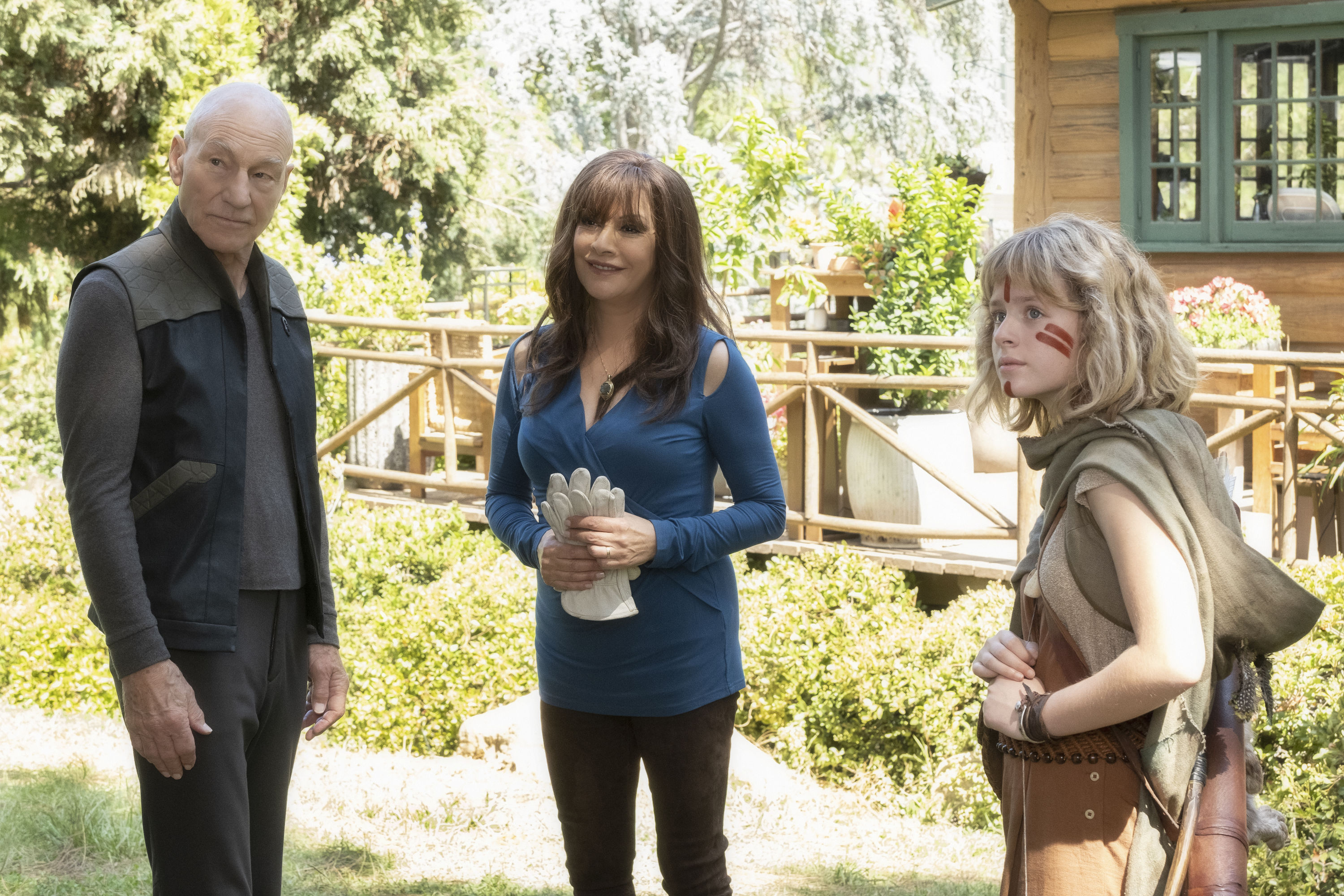
Credit: CBS
There have been plenty of good Star Trek episodes focused on Deanna Troi ( Marina Sirtis ) over the years. The good counselor of the USS Enterprise-D on Star Trek: The Next Generation was always there to help her fellow crewmates or sense that something was afoot, and every now and then an episode would give her the spotlight — “Face of the Enemy” in Season 6 comes to mind as being an excellent one.
Even so, Troi never quite got the showcase she deserved until Star Trek: Picard , which gave her the best episode she's ever had.
You get the feeling every now and then that TNG never really figured out what to do with the character. As far as Season 1 is concerned, there are long stretches where she doesn’t appear at all. Other episodes feature great work from Marina Sirtis but aren’t necessarily favorites (“The Child” in Season 2). Most of our favorite Troi moments come when she’s a supporting character in other stories focused on others — Riker (constantly), Worf (especially in “Ethics”), Barclay (in almost every episode he’s in), etc. Then there are the movies.
The TNG films almost forget that she exists. She takes the helm briefly in Star Trek: Generations , has a hilarious scene of being drunk in Star Trek: First Contact , rekindles with Riker in Star Trek: Insurrection , and then deals with some Shinzon mind invasion in Star Trek: Nemesis . She is never given anything in these movies that would count as an actual subplot, though — that honor goes to Data in every single film.
She’s always there to help and support others in all of her appearances. When she has a crisis of her own, she deals with it, but these episodes are few and far between, and even then, they aren’t necessarily all-time favorites. We always loved Deanna, but it’s our opinion that she never received the proper showcase with which to really shine.
That changed with Star Trek: Picard in the episode “Nepenthe.” It features Deanna Troi at her very best, with Marina Sirtis at the height of her powers.
A great deal of this episode features Troi serving in her vocation — being a counselor. She gives much-needed advice to Picard (as well as some necessary tough love), and she also gives warm counsel to Soji, who at this point in the season is utterly lost. We see her here as a wife and as a parent, and she hasn’t lost a single counseling step.
That's on the surface, though. She is undergoing immense grief of her own, as her first child with her Imzadi died years before. That’s why they are on this planet, and that’s why they’ve stayed. She is processing immense heartache and guilt, and she doesn’t really know how to move past it.
Other characters in crisis can rely on the wise words of Deanna Troi to get them through the tough times, but where does Troi herself go? What happens when the counselor needs a counselor?
She’s had dramatic moments of crisis before. She lost her telepathy in “The Loss,” had and lost a space-child in the aforementioned “The Child,” and so on — but this is a situation with a depth that we’ve never seen her go through before. Not really. We suppose if Guinan (or Beverly Crusher) were around she’d have somewhere to turn, but they aren’t. She has to remain a rock for her family, and for the two runaways that just showed up on her doorstep. No cracks are allowed in her professional veneer.
The most incredible moment of the episode comes when a crack shows itself anyway. She breaks down just a little in front of Jean-Luc, lets it get personal for just a moment, and admits that she’s not as strong as she used to be. Picard tells her that’s because she’s gained wisdom, and he’s not wrong. Wisdom comes through experience, and they’ve all gotten a ship full of that in the years since Data first sang "Blue Skies."
It wasn’t until she said that line to Picard that we realized what strength this character has always had. When not in the midst of a wacky (yet enjoyable, always) sci-fi episodic convention, Troi was always strong and dependable for everyone. She was also warm and trusting. You could rely on her when you could rely on no one else.
When she first appeared on Picard , though, we realized that we’d always taken that warm, reliable trust for granted. She enters toward the middle of the season, and everything is awful. Nobody trusts anyone, everyone is suffering, and it feels like the galaxy is burning. Everyone is turning Picard away like he’s a 50-foot Gorn made of randy trash.
Deanna appears with a warm embrace, says she’ll help however she can, and suddenly we're all OK. Picard is OK, Soji is OK, and we the viewers are OK. Our rock of trust is here. We never fully appreciated her before, but damn did we need her in that moment.
“Nepenthe” continues to be an ensemble affair, with Picard, Riker, and the crew of the La Sirena all getting in their necessary moments. It’s Deanna’s episode, though. We needed her counsel, and we also needed someone to actually take the time to ask if she herself is okay. She’s not okay, but she will be.
This was no “oh no, Mother’s coming on board and I have another random love interest” episode for her. It was no funny toss-off line about breasts firming up, or whatever that was. Without even being the focus of the episode, Deanna Troi proved once and for all that she’s capable of so much more than that, and Sirtis plays notes that she'd never gotten the chance to play before: strong, yet vulnerable; professional, yet personal; stern, yet loving. That's Deanna Troi, and it always has been. It's just never been as clearly depicted.
She proves here to be the embodiment of all the messages of Trek , though, like everyone else on this show, she's still "working on it." She's not perfect, but she has no ego to maintain. She also showcases another superpower, one that’s constantly overlooked in our society. It’s not just because her Betazoid telepathy makes her a natural at it, either.
In the episode, she proves what the power of empathy can do, especially when talking with Soji. A newly activated synth who was just told her entire life is a lie by a lying, abusive Romulan boyfriend? It would challenge any psychiatrist, but Troi is on it. She can't use her telepathic insights with Soji, no more than she could with Data. She doesn't need to, though. She's a natural at it with or without the gifts of her species. Even when Deanna is breaking apart on the inside, her empathy and compassion for others never waivers.
She’s a character that we all could learn a lot from, especially right now... some of us just hadn’t noticed. Star Trek: Picard made us take notice at last.
- Star Trek: Picard
Related Stories
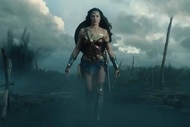
Themyscira, the Longest-Running Utopia in Comics
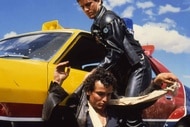
How Mad Max Pioneered the Post-Apocalyptic Worlds We Love
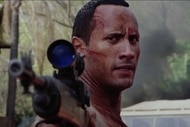
Remembering Dwayne “The Rock” Johnson in The Rundown

Knock at the Cabin's Abby Quinn on Getting Killed by Shyamalan
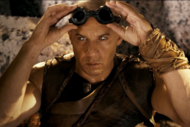
Vin Diesel Righted the Science Fiction Ship with Riddick
Wonder woman: dc’s most complete movie since batman.
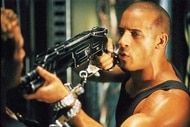
'Pitch Black' and the Science of Enhanced Vision

Spy Kids is Still a Benchmark For Latinx Representation in Blockbusters
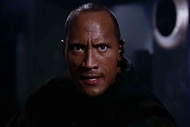
Hot Take: The Rock and Karl Urban's 2005 Doom Movie Doesn’t Suck

Hidden Horrors of Peacock: Bliss

Puss in Boots: The Last Wish Directors On That 'Shrek' Tease
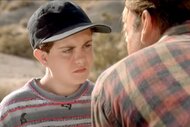
Jurassic Park's '6-Foot Turkey' Kid Looks Back on Iconic Role
Recommended for you.

Linda Hamilton on Resident Alien Role: "I'm Not the Funny Girl, I'm the Straight Man"

The Classic Twilight Zone Episode That Inspired Jordan Peele's Us

Resident Alien's Alan Tudyk on Harry's New Love Interest, Edi Patterson's Blue Avian
Star Trek: The Next Generation (TV Series)
The child (1988), marina sirtis: counselor deanna troi.
- Quotes (13)
Photos

Quotes
[the crew is discussing whether Troi's unborn child might pose a security risk]
Counselor Deanna Troi : Captain.
[the senior officers abrubtly stop their discussion and focus on Counselor Troi]
Counselor Deanna Troi : Do whatever you feel is necessary to protect the ship and the crew. But know this: I'm going to have this baby!
Captain Jean-Luc Picard : Then it would seem that the discussion, is over.
[folds his hands in reservation to the impending situation]
Captain Jean-Luc Picard : .
Lt. Commander Data : [on Troi's delivery of Ian] Thank you for allowing me to participate. It was remarkable.
Counselor Deanna Troi : [Commander Riker approaches, smiling, Troi looks to him] Were you here all along?
Commander William T. Riker : Yes. He's beautiful, Deanna. Just like his mother.
[grins, leans in and kisses Deanna's cheek]
Dr. Kate Pulaski : How do you feel?
Counselor Deanna Troi : Fine. Wonderful.
[looks to the baby in her arms, then back to Pulaski]
Counselor Deanna Troi : Thank you, Doctor, for everything.
Dr. Kate Pulaski : Amazing.
Counselor Deanna Troi : [Deanna looks back to the baby again, smiling. A tear of happiness and joy rolls down her cheek, as she sighs a deep breath]
Counselor Deanna Troi : [right before giving birth] You don't have to do anything, Data. Just be with me.
Dr. Kate Pulaski : There's nothing to be nervous about.
Lt. Commander Data : Nervous? I find this very interesting.
Captain Jean-Luc Picard : Ian, could you tell us why you're here?
Ian Andrew Troi : Because Mommy said it was time to eat.
Captain Jean-Luc Picard : No, I mean, why're you here on this ship?
Ian Andrew Troi : I live here.
Counselor Deanna Troi : Ian, I think the Captain wants to know if you are ready to tell us why you came here.
Ian Andrew Troi : No. Not yet.
Counselor Deanna Troi : The answer is within him. When his cognitive powers have sufficiently developed, he may be able to articulate it.
Captain Jean-Luc Picard : I hope he will tell us soon.
Captain Jean-Luc Picard : Acting Ensign Wesley Crusher has expressed his desire to remain on the Enterprise.
Commander William T. Riker : I see. And, how did you respond?
Captain Jean-Luc Picard : I haven't yet, Number One, I didn't feel it was my decision alone. His remaining, will have effects on all of us.
Commander William T. Riker : Good point, with his mother gone, who will see to his studies?
Captain Jean-Luc Picard : That's true. Of course, that responsibility would fall to Commander Data.
Commander William T. Riker : And, who will tuck him in at night?
Wesley Crusher : [embarrassed] Come on, Commander!
Lieutenant Worf : [somewhat reluctant] I will accept that responsibility.
Counselor Deanna Troi : Well, we know he'll get his sleep
[looks to Worf and smiles]
Counselor Deanna Troi : .
Captain Jean-Luc Picard : [looks to Riker, put his hand on his chin in thought] You know, Number One? It seems to me that you would be best suited for these responsibilities. Are you willing to serve?
Commander William T. Riker : Difficult decision.
[Riker looks to Wesley, who looks back in quiet anticipation. Riker grins]
Commander William T. Riker : Yes, I can do that.
Captain Jean-Luc Picard : [looks to Wesley] Very well, Mr. Crusher, contact your mother at Starfleet Medical, give her my regards, and tell her that you have my permission to remain on the Enterprise. But
[points to Wesley]
Captain Jean-Luc Picard : I will abide by her wishes.
Wesley Crusher : [grins] Yes, Sir! Thank you, Sir! I know she'll agree!
Captain Jean-Luc Picard : Now, do you have course and speed laid in?
Wesley Crusher : Yes Sir, they are!
Captain Jean-Luc Picard : Very well, Mr. Crusher. Engage.
[Wesley grins, and sets the Enterprise's next course]
Commander William T. Riker : I don't mean to be indelicate,
[turns to Troi]
Commander William T. Riker : but who's the father?
Counselor Deanna Troi : Last night, *while I slept*, something, that I can only describe as a presence, entered my body.
Captain Jean-Luc Picard : A life form of unknown origin and intent, is *breeding*, right now, inside of Counselor Troi. Our purpose here today is determine what course of action we need to take.
Lieutenant Worf : The decision is clear. The pregnancy must be terminated to protect the ship.
Commander William T. Riker : [as the bridge crew is discussing the issue, Troi hears a heartbeat within her mind, and looks down at her stomach, then back up to the conference room screen which shows a gestating fetus. The crew's voices are muffled, but can still be clearly heard as Troi is focusing on the baby growing inside her] This situation presents a danger to us and the counselor. It's an invasion, of what, I don't know.
Lt. Commander Data : Captain, this is a life form. Denying it the right to survive, takes away our opportunity to study it.
Counselor Deanna Troi : [Data encounters Counselor Troi in the corridor, breathing heavily and holding her stomach] Data? Would you help me to Sickbay?
[Data acknowledges and takes Deanna by the arm, helping her]
Counselor Deanna Troi : [the doors open to Sickbay, Data and Deanna enter] It's time!
Dr. Kate Pulaski : [runs up] Oh, you bet it is! Let's get you to maternity!
[takes Deanna by the arm]
Lt. Commander Data : [clicks his combadge] Security team to sickbay.
Dr. Kate Pulaski : Is that really necessary?
Lt. Commander Data : Yes, Doctor. Captain's orders.
Dr. Kate Pulaski : I don't see the need for *armed guards* in the delivery room.
[shakes her head]
Dr. Kate Pulaski : . This way.
Dr. Kate Pulaski : [Pulaski rushes in and begins to examine Ian] What happened? Did he eat anything, did he fall?
Counselor Deanna Troi : [shakes her head] No!
Lt. Commander Data : [reads the readout on his tricorder] Commander, the child is the source of the unusual radiation.
Counselor Deanna Troi : Ian said he was the reason the ship was in danger.
Lt. Commander Data : That analysis is correct.
Dr. Kate Pulaski : [continues to try to bring Ian around] I'm losing life signs.
Counselor Deanna Troi : [holds Ian's lifeless hand] You must save him!
Dr. Kate Pulaski : [Pulaski continues to work, but to no success. She runs her scanner over Ian again, then bows her head] I'm sorry.
[Troi kneels down and begins to weep over the loss of her son. Suddenly, Ian's body disappears and becomes a small, radiant star of energy. The energy star floats into Troi's open hands and Deanna cups her hands around it. Her weeping slowly subsides, then she smiles. Finally, like releasing a dove, she opens her hands and the energy star floats up and through the bulkhead into space]
Dr. Kate Pulaski : [Riker's combadge beeps]
Lieutenant Geordi La Forge : Commander, the containment field has... stabilized!
Commander William T. Riker : Thank you, Lieutenant.
Counselor Deanna Troi : Then Ian was right. He was the cause.
Commander William T. Riker : Apparently so.
Counselor Deanna Troi : [Deanna shakes her head and looks down for a moment, then looks back up at everyone] He is a life force entity. When we passed each other in space, he was curious about us, so he thought the best way to learn, was to go through the process. To be born, to live as one of us, and in that way, to understand us. He never meant any harm.
Commander William T. Riker : There was a moment, when you smiled.
Counselor Deanna Troi : He said "Thank you". I told him, we will miss him.
[looks down again]
Counselor Deanna Troi : And, I will.
Ian Andrew Troi : [being tucked into bed by Deanna] I can feel that some of the people are very worried.
Counselor Deanna Troi : Yes, I feel it too. But don't you worry
[smiles and lovingly strokes Ian's hair]
Ian Andrew Troi : It's me, Mommy! I'm the reason.
Counselor Deanna Troi : What?
Ian Andrew Troi : It's me.
Counselor Deanna Troi : You?
Ian Andrew Troi : Yes. I have to leave you now, or it will be very bad for everyone.
Counselor Deanna Troi : Leave? You're going to die! No, you can't!
[shakes her head no in desparation, and clicks her combadge]
Counselor Deanna Troi : Sickbay, this is Counselor Troi! I need a doctor in my quarters, NOW!
[Ian has stopped breathing, Troi leans down and begins to shake Ian trying to bring him out of it]
Counselor Deanna Troi : Ian! Ian, No Ian!
Captain Jean-Luc Picard : Counselor Deanna Troi is pregnant. She... she is going to have a baby.
Commander William T. Riker : Baby?
[everyone looks at Deanna]
Commander William T. Riker : This is a surprise.
Counselor Deanna Troi : More so for me.
[Troi undergoes a completely painless delivery]
Dr. Kate Pulaski : Are easy births the norm for Betazoids?
Counselor Deanna Troi : Not according to my mother.
[Dr. Pulaski mentions that in her experience, the fathers were almost always present during their babies' delivery]
Counselor Deanna Troi : Difficult under the circumstances.
Lt. Commander Data : Perhaps *I* could serve in that capacity.
Dr. Kate Pulaski : Counselor Troi is going to need the comfort of a human touch and not the cold hand of technology.
Counselor Deanna Troi : Doctor, I think Commander Data will do very nicely.
Dr. Kate Pulaski : Your choice.
Lt. Commander Data : [to Counselor Troi] Although I know, in technical terms, how life is formed. There are several things about the process that alludes me. The child inside you, Are you able to access his thoughts? Does he have thoughts? You are aware of him, Is he aware of you? When does that awareness begint?
Counselor Deanna Troi : [starting to give birth] It's happening...
Lt. Commander Data : [thinking she is connecting with her unborn child's thoughts] How does it feel?
Counselor Deanna Troi : Data!
Lt. Commander Data : Yes?
Counselor Deanna Troi : NOW!
Lt. Commander Data : [realizing what Troi has been trying to tell him] Now? Now? Now! Doctor! Doctor! Doctor!
Dr. Kate Pulaski : [coming over to assist Troi's delivery] This is an impatient baby! He's very eager to make his appearance.
Release Dates | Official Sites | Company Credits | Filming & Production | Technical Specs
- Full Cast and Crew
- Release Dates
- Official Sites
- Company Credits
- Filming & Production
- Technical Specs
- Plot Summary
- Plot Keywords
- Parents Guide
Did You Know?
- Crazy Credits
- Alternate Versions
- Connections
- Soundtracks
Photo & Video
- Photo Gallery
- Trailers and Videos
- User Reviews
- User Ratings
- External Reviews
- Metacritic Reviews
Related Items
- External Sites
Related lists from IMDb users

Recently Viewed

Creating Counselor Troi

The character of Deanna Troi, and her relationship with the ship’s first officer, Will Riker, was modeled on Lieutenant Ilia. The bald Deltan had been intended as a permanent addition to the Enterprise crew in Star Trek: Phase II but appeared only once, when that series was turned into The Motion Picture . (See Creating Lieutenant Ilia .)
Like Ilia, Troi is an empath. Like the Deltan, she hails from an alien world with liberal attitudes to sexual relations.
The last part came later. Denise Crosby, who ended up playing security chief Natasha Yar, told Entertainment Weekly in 2007 that, originally, “Troi was this cool, Icelandic blonde. Almost Spock-like.” Marina Sirtis was reading for the role. Crosby was auditioning for Troi.
Somewhere, about the second or third audition, Gene Roddenberry had this idea: Let’s just switch them and see what happens.
Tasha, who was written as a Latina, became Caucasian. Troi became first quarter- and later half-Betazoid.

Makeup and accent
There was a suggestion to give Troi three breasts, but Dorothy C. Fontana, a veteran of the original Star Trek series and once again the only female writer on the show, objected:
I felt women have enough trouble with two. And how are you going to line them up? Vertically, horizontally, or what? I was like, please, don’t go there. And they didn’t, fortunately.
To make the Betazoid Troi exotic, Sirtis wore black contact lenses and a hairpiece. She also spoke with an accent.
Sirtis, who was born in England to Greek parents, is quoted in James Van Hise’s Trek: The Next Generation as saying,
I didn’t want anyone to pin down my accent to any particular country.
In a commentary for the 2002 DVD release of Season 1, she elaborated:
It was an Eastern European accent, which kind of started with the Tasha Yar auditions, ’cause she was supposed to be from Eastern Europe. Then, when they told me to make an accent up, from Betazed, I kind of just modified that Eastern Europe accent a bit. I based it on a friend of mine, who’s actually Isreali.
The accent would wane over time to the point where Troi sounded American in the movies.

Troi wore a “skant” (unisex skirt) in the pilot, “Encounter at Farpoint”. It would be years before she appeared in uniform again.
Sirtis told Starlog in 1988 that, after the first episode,
the producers decided that the look didn’t suit the character the way she was originally envisioned. They wanted something a bit more elegant and contained.
The actress was given various dresses to wear, a new one every season.
The downside, Sirtis lamented, was that the more cleavage her costumes revealed, the less cerebral her character seemed to become.
When Captain Jellico (Ronny Cox) told Troi to put on a uniform in Season 6’s “Chain of Command”, Sirtis was thrilled, telling the BBC :
First of all, it covered up my cleavage and, consequently, I got all my brains back, because when you have a cleavage you can’t have brains in Hollywood. So I got all my brains back and I was allowed to do things that I hadn’t been allowed to do for five or six years. I went on away teams, I was in charge of staff, I had my pips back, I had phasers, I had all the equipment again, and it was fabulous.
Sirtis’ Season 7 publicity photo is the only one in which she appears in Starfleet uniform.
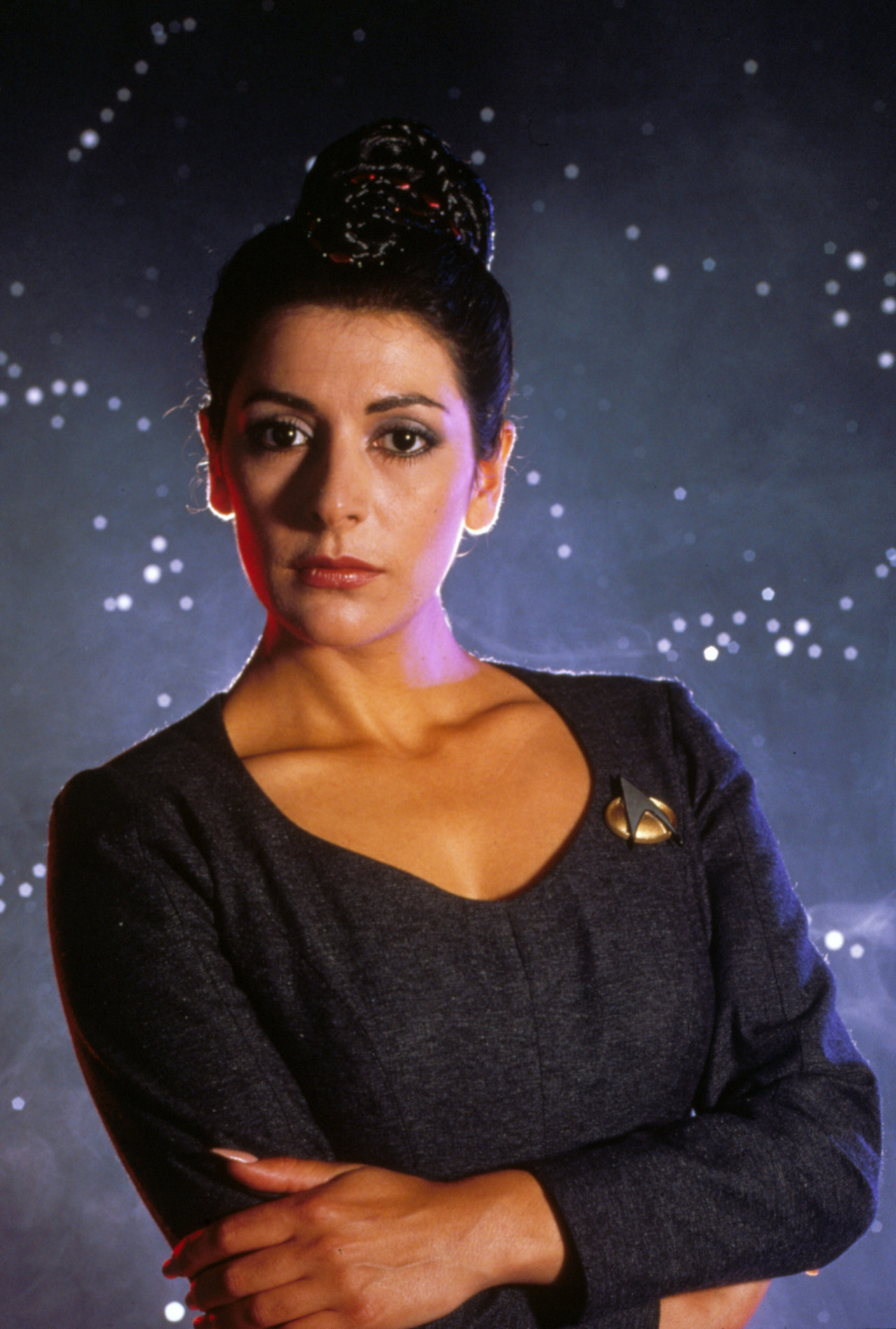
Non-threatening
In her 1988 interview with Starlog , Sirtis said the women of The Next Generation were getting a “pretty fair crack”.
The chief of security is a woman, the captain takes my advice very seriously and Dr Beverly Crusher is the only one who can declare the captain unfit.
Four seasons in, she was more critical, telling Cinefantastique in 1991:
The women on this show are very non-threatening. I don’t think it’s realistic. It’s not realistic for the twentieth century, so it’s definitively not realistic for the twenty-fourth century. Ever since Denise [Crosby] left the show, the two women that are left are both doctors in the caring professions. You don’t see women in power positions.
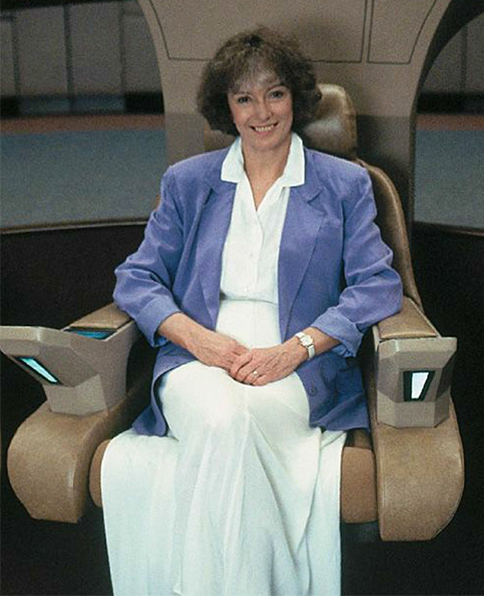
Jeri Taylor, who joined The Next Generation at the beginning of Season 4 and remained the only woman on its writing staff (Fontana had left at the end of Season 1), agreed, telling Cinefantastique in 1993:
They had been put in caretaker roles. It’s hard to find stories that break them out of that mold.
It didn’t help that some of the male writers didn’t see much use for a counselor at all.
Brannon Braga is quoted in The Fifty-Year Mission: The Next 25 Years as saying,
A therapist on a ship full of characters that supposedly had gone beyond human foibles and no longer succumbed to petty jealousy and anger?
Tracy Tormé, who also served as story editor during the first season, argued the character was too “soft” and “touchy-feely”. But then, Tormé, who wrote the episode “Conspiracy”, thought The Next Generation was too “timid” altogether and he left after two seasons.
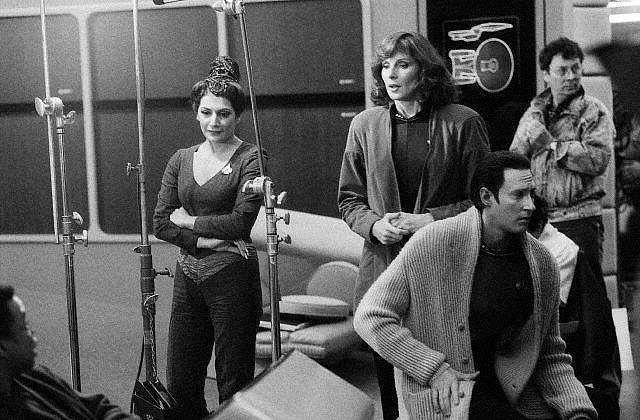
Writing Troi
In the beginning, Sirtis struggled with how much emotion to show, telling Star Trek: The Magazine years later:
I didn’t understand what I was doing. I had the impression that Troi was an open sore of emotions, but I wasn’t aware that you didn’t have to show emotion to get the message across.
The writers weren’t sure either.
In “Encounter at Farpoint”, Troi communicates with Riker telepathically, a skill she would later use only with her mother. Sirtis told Starlog the producers decided too much ability would be “too limiting” to the character.
So they changed the level of Troi’s powers. Now, when I experience something, it’s a very strong emotion and that frees my character up to have more substance and scope.
But it was seldom exploited. Sirtis told SFX for a special Star Trek edition released in 2013 that Troi was written out of several Season 1 episodes because her ability to sense feelings would have killed the drama. She feared she might even lose her job, but then Crosby quit and Gates McFadden was fired, leaving Sirtis the only woman of the first season to make it into the second.

Sirtis told Star Trek Monthly in 1997 that it wasn’t until the third season that Troi became more grounded. “She became less decorative and more interesting.” But there was still some way to go.
Michael Piller, who joined as a writer by then, confessed in a 1990 interview with Cinefantastique that he struggled with writing Troi:
The trouble with Troi is that because she’s an empath, you think she walks into a room and says, “I feel pain.”
He knew that was a cliché:
She is a total woman who has feelings of her own with a job to do on the Enterprise . She’s the captain’s most trusted confidant, valuable in dealing with strategic issues.
But his colleague Ronald D. Moore also had a hard time finding things for Troi to do:
It is difficult, because you run into a double trap of how much does she know and when. Especially when dealing with powerful aliens. It’s unfortunate, because the things she’s had, she’s been wonderful in.
Sirtis herself had no desire to get involved in writing, telling Cinefantastique ,
My basic theory of acting is you learn your lines and try not to bump into the furniture.
She would meet the writers for lunch once or twice per season to talk through Troi’s development.
Taylor made a conscious effort to inject more life into the character, telling Cinefantastique in 1992:
She was underutilized, somewhat one-dimensional. She did one thing: she sensed things. The actress is just too good not to let her stretch herself. I tried to broaden her role.
In an attempt to strengthen Troi’s character in Season 4, the writers chose to develop an often-pitched story in which she loses her empathetic powers. This became “The Loss”.

“This basic idea has been pitched to us every season,” Piller told Cinefantastique in 1991.
Finally, because we needed a Troi show, we said, let’s do it here.
Author Sara Century writes for the official Star Trek website that the episode showed a tremendous amount of growth “by targeting and suspending the thing that Deanna relies on for everything — her intuition.”
By inhibiting her ability to empathize, the threat of the week showed us how the generally brave and calm Deanna deals without her own supreme inner harmony. The answer is, not great, but isn’t that more relatable?
“Man of the People” gave Sirtis another opportunity to act out of character. Troi becomes a receptacle for the negative emotions of a peace envoy and undergoes a dramatic metamorphosis.
“Face of the Enemy” (which was also directed by a woman, Gabrielle Beaumont) put her in a position where her empathic abilities weren’t relevant at all. Troi wakes up looking like a Romulan and discovers she must safely transport a defector to the Federation.
The writers had finally figured out Troi could do more than probe the intentions of the alien of the week. Toward the end of the series, Piller told Cinefantastique :
Marina is one of the great talents and nobody really knew it when this whole thing started. The more we give her to do, the more she seems capable of doing.
Troi’s brief and late-series romance with Worf confused and even upset some fans, but Century believes it was the better parts of both of their character arcs. Troi and Worf might appear to have little in common, but their relationship put an emphasis on their “substantial emotional common ground.”
Both are incredibly loyal, prideful and easily angered, but both are also deeply gentle spirits that struggle with violence on a profound and often unspoken level. Though he isn’t always forthcoming, Worf is easily one of the most emotional people on the crew. Troi’s light pushing of Worf to be more open, honest and communicative about his many feelings helped Worf. Meanwhile, his passion and sense of honor gave Troi the stable foundation she needed to express her interest in him.
The romance was short-lived, but Century argues it allowed viewers see the characters through a new lens.

Of course, the more permanent love interest in Troi’s life was Riker. After a few close encounters early on, the two settled into a friendship where they would often seek out each others’ counsel, notably when Riker was attracted to a member of an androgynous race who identified as female in “The Outcast”.
Sirtis told fans on the 1991 SeaTrek cruise that they should not expect the romance the blossom:
Forget about it! It’s not going to happen! Jonathan and I play a lot of stuff that ends up on the cutting room floor. We would like to see the characters have a relationship, but the producers want him to be “stud of the galaxy” to boff the “bimbo of the week”.
Taylor put it more diplomatically:
It’s not anything we have any interest in developing, because it leads you into constricting traps. We acknowledge that there was a relationship between Riker and Troi. They have a profound friendship. I don’t think you should close any avenue off in a series that may go on for many more years. We draw on that relationship for subtext.
It wasn’t until Star Trek: Insurrection that the characters were drawn back together by the rejuvenating influence of the Ba’ku planet. In early drafts, they merely flirted and kissed. It was at the studio’s suggestion that Piller, who wrote the script , developed the relationship more seriously.
In the next and final movie of The Next Generation , Nemesis , the couple got married.
Radical empathy

Looking back on her role in a 1995 interview with Star Trek: Communicator , Sirtis said Troi was always the “nicest person aboard the Enterprise ” for her, “because, instead of being wacky and zany, she was always understanding and sympathetic toward people.”
Century argues this “radical empathy” was Troi’s strength. In a lot of fiction, she points out, women’s emotions devour and destroy them. Female empaths and telepaths are frequently portrayed as unstable and prone to losing control. “That’s never the case with Troi.” She “shows that people who are guided by their hearts actually have a bit of an edge in life.”
We live in a society that views compassion as a weakness, particularly feminine compassion. The message that to care is to give up your strength is instilled through media, culture, even in the mechanics of our very language. Allowing yourself to feel the world with one or two degrees less of a protective layer around your heart takes courage, and courage takes power. Like many highly sensitive people, Deanna Troi is regularly underestimated and her importance reduced. Through her patience and understanding, Troi insists that forcing yourself to view the world with empathy makes you a stronger person, not a weaker one.


- View history
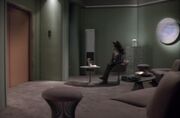
The counselor's office aboard the USS Enterprise -D
A counselor was a position aboard Starfleet vessels and installations, usually held by a senior Starfleet officer with training in psychology and psychiatry , with the intention of helping their patients with overall mental wellness.
Qualified psychiatrists served aboard starships during the 23rd century . ( TOS : " Where No Man Has Gone Before ", " Dagger of the Mind ") Occasionally, the role of chief medical officer and counselor were combined in the 23rd century, with medical officers also having expertise in space psychology ; an example of this is Doctor Leonard McCoy . ( TOS : " Court Martial ")
By the mid- 24th century , starship and starbase crews included a counselor, who was responsible for the mental well-being of the crew and civilian staff. The position was considered vital enough that it warranted inclusion in the senior staff of the Federation flagship ; in that instance at least, the ship's counselor also had a diplomatic role, advising the captain in first contacts and other situations.
As with the chief medical officer , the ship's counselor has the power to relieve other officers and crewmembers of duty if he or she feels that their patient is suffering from a condition that may hinder their ability to perform their duties effectively, including the ships captain.
At the captain's discretion, the ship's counselor may be allowed to wear something other than their normal Starfleet uniform . This was the case with Deanna Troi , the ship's counselor on the USS Enterprise -D , who preferred to wear colorful, casual clothing while on duty. Troi elected to wear a standard uniform permanently after being told to do so by Captain Edward Jellico . ( TNG : " Chain Of Command, Part I ")
Lieutenant Commander Christopher Hobson of the USS Sutherland remarked that no one would ever suggest a Klingon to be a good ship's counselor, as he considered them unsuited for such a position. Some Starfleet officers, such as Captain Lisa Cusak and Chief Miles O'Brien , disliked the concept of a designated ship's counselor, preferring to seek advice about their problems from friends. ( TNG : " Redemption II "; DS9 : " The Sound of Her Voice ")
Counselors [ ]
Deanna Troi trained in psychology before joining Starfleet. She served as counselor aboard the USS Enterprise -D and the USS Enterprise -E before transferring to the USS Titan with her husband, William T. Riker . ( TNG : " Encounter at Farpoint "; Star Trek Nemesis ; LD : " No Small Parts ")
Deep Space 9 had several counselors during its time in operation, including Telnorri and Ezri Dax , who was previously an assistant counselor on the USS Destiny . ( DS9 : " Hard Time ", " Shadows and Symbols ")
The USS Voyager was not originally assigned a counselor, as the nature of its mission didn't require one. ( VOY : " Phage ", " The Cloud ") Later, Neelix appointed himself morale officer , a position of his own invention, to take on the responsibilities of a counselor. ( VOY : " The Cloud ") The Doctor later began developing a psychiatric subroutine to make himself "even more valuable" to Captain Kathryn Janeway . ( VOY : " Repentance ")
Benbasset was a counselor assigned to Starbase 235 in 2375 . ( DS9 : " It's Only a Paper Moon ")
Jenzo , a friend of Deanna Troi, was a counselor in 2376 . ( VOY : " Life Line ")
In 2380 , Doctor Migleemo served as the counselor aboard the USS Cerritos , though he was regarded by Ensign Beckett Mariner as "the worst counselor in the fleet". ( LD : " Crisis Point ")
In 2402 , Captain Seven of Nine appointed Ensign Jack Crusher as her special counselor. ( PIC : " The Last Generation ")
In 3190 , Doctor Hugh Culber was serving as both a physician and ship's counselor of the USS Discovery , something which Captain Michael Burnham noted could not be easy for him. ( DIS : " Choose to Live ")
External links [ ]
- Counselor at Memory Beta , the wiki for licensed Star Trek works
- Mental health counselor at Wikipedia
- 1 Daniels (Crewman)
- 3 Calypso (episode)
Why Deanna Troi Wore a Starfleet Uniform in TNG's Final Seasons

Your changes have been saved
Email Is sent
Please verify your email address.
You’ve reached your account maximum for followed topics.
Quick Links
Deanna troi's starfleet uniform, explained, how marina sirtis felt about deanna troi's new uniform, deanna troi almost wore a different starfleet uniform.
- On Star Trek: The Next Generation , Counselor Deanna Troi wore different uniforms than the rest of the USS Enterprise crew.
- In the pilot episode, Deanna Troi was seen the Starfleet skant, which actor Marina Sirits called "the cosmic cheerleader" outfit.
- However, near the end of Star Trek: TNG Deanna Troi starts to wear a Starfleet uniform and she has a good reason to do so
One of the most underappreciated characters on Star Trek: The Next Generation was the newest addition to the Enterprise's bridge crew. Recognizing the importance of mental health, a counselor was added to the cast of Starfleet officers. Yet, Deanna Troi rarely wore a Starfleet uniform until the final seasons of The Next Generation , and the reason is surprising. Interestingly, despite spawning three sequel series, no other Star Trek series of the era included a ship's counselor, making Troi unique.
The real-world reason for Deanna Troi's penchant for civilian attire was not as high-minded as Star Trek is supposed to be. Given the full-body costumes, there was little in the way of showing skin among the cast. Skimpy outfits for series regulars and guest stars were very common for Star Trek: The Original Series . However, the late 1980s and 1990s were different times. The new costumes provided a way for producers to add some "sexy" to the bridge, and it came via the low-cut, skin-tight outfits actor Marina Sirtis was forced to wear. The in-universe rationale, however, makes sense. The USS Enterprise-D was a ship with a crew complement of more than a thousand people, as well as civilians and children. The Starfleet uniform is a symbol of authority, so Troi wore civilian clothes, without rank, to make people feel more comfortable . Yet, it's that symbol of authority that inspired her to later wear only Starfleet uniforms while on duty in The Next Generation Seasons 6 and 7.
Updated by Joshua M. Patton on March 3, 2024: This article has been updated to expand upon the characterization of Deanna Troi and comport to CBR's current formatting standards.
Why Star Trek: The Original Series Was Canceled and Brought Back
Despite being an instant sensation Star Trek: The Original Series was canceled by NBC after three seasons but that's when it really became successful.
In the series pilot episode, Deanna Troi wears the "skant," a mini-skirt uniform worn by both men and women. "I was dressed as the cosmic cheerleader...[i]magine a potato with matchsticks sticking out of it," Sirtis says The Fifty-Year Mission: The Next 25 Years: From The Next Generation to J. J. Abrams: The Complete, Uncensored, and Unauthorized Oral History of Star Trek by Edward Gross and Mark A. Altman. After that episode, however, she sticks to civilian clothes, though the actor didn't find these outfits any more flattering. It wasn't until the two-part episode "Chain of Command" in Season 6, that she finally got her Starfleet uniform.
In the episode, Ronny Cox guest starred as the infamous Captain Jellico, given command of the Enterprise while Captain Picard went off on a secret mission. Jellico's brusque style contrasted in many ways with Picard's, causing serious friction with First Officer Will Riker . As Counselor Troi tries to explain to Jellico why the crew is resisting his many commands, he tells her to start wearing her uniform . He appreciated "formality on the bridge." After this episode, Troi is rarely seen out of uniform. While some might suggest it was Jellico's influence, Troi started this particular journey a season earlier. The Season 5 episode "Disaster" involved a massive power outage on the Enterprise. Troi is the senior officer on the bridge and has to take command. Despite problems with how the character was written, "Disaster" is a great episode for Troi. She's uncertain in her role, and the officers under her command challenge her decisions. A member of the empathic Betazoid species, Troi uses her emotions in command, going with the orders that "feel" right. During "Conundrum," a later Season 5 episode where everyone loses their memories, she's the only one who notices something is wrong.
A Season 7 episode of The Next Generation , "To Thine Ownself," potentially explains why Troi stayed in uniform. She mentions her brief time in command as both a frightening and exciting challenge. So, she decides to go up for promotion to full Commander. While she never mentions the Starfleet uniform, if Deanna Troi wanted to lead, she needed the authority a uniform provided . She still wore civilian clothes while off-duty, but once in uniform, the ship's counselor became a more involved member of the crew. This continued into the movies, where she donned the new grey and black uniform introduced in Star Trek: First Contact . However, in Star Trek: Picard Troi sticks to civilian clothing until she gets one of the leather Starfleet field jackets the rest of the crew wear.
Synthehol: Star Trek's Sci-Fi Take on Alcohol, Explained
Of the many strange concepts on Star Trek, from warp speed to a post-scarcity economy, but none more confusing than the fake alcohol called snythehol.
The creation of Deanna Troi is one of the Star Trek: Phase II ideas in The Next Generation , recycled by Gene Roddenberry. The character of Ilia, a Deltan, was used in The Motion Picture , and Troi was her replacement. The Betazoid abilities were supposed to be more than mere empathy, specifically manifesting in an increased libido. The character was even supposed to have three breasts, though writer Dorothy "D.C." Fontana talked Roddenberry out of that. While it seems sexist now, it's equally possible it was a misguided attempt to challenge the moral conventions of the time about women and sex. Just as skants provided an updated version of The Original Series ' miniskirt but subverted expectations being worn by both men and women.
Still, as far as Sirtis was concerned, Deanna Troi's characterization improved once she donned a Starfleet uniform . "I was thrilled when I got my regulation Starfleet uniform," she told the BBC in 2001 , "consequently, I got all my brains back because when you have a cleavage, you can't have brains in Hollywood." Once she was in uniform, Troi would go on away missions, use phasers, and generally take part in more action-oriented scenes than she did before. Even still, Sirtis may be selling the early seasons of Troi a little short. While not always written strongly, her character has always been a vital part of the crew in the eyes of both fans and her castmates.
Whether in uniform or more revealing civilian clothes, Deanna Troi is a remarkable character. She is the most compassionate and caring character on the show, save perhaps for Whoopi Goldberg's Guinan. She carved out a place for herself among leaders, warriors, and scientists with her depth of concern for people. At its core, that is what Star Trek is supposed to be about. However, the change had an effect on Sirtis, and her performance as Troi only got stronger once she started looking like a true member of Starfleet .
Star Trek's Patrick Stewart Recalls Lashing Out at Next Generation Co-Stars
Patrick Stewart said he "could be a severe bastard" on the TNG set, detailing when he lashed out at co-stars and stormed off to his trailer.
While Marina Sirtis appreciated wearing what the cast calls "the spacesuit" more than civilian attire, she almost wore a uniform of a different color. When Star Trek: The Next Generation was still in the casting process, Sirtis auditioned for the role of security officer Tasha Yar. Meanwhile, model and actor Denise Crosby read for Troi. It was series creator Gene Roddenberry who made the call for the two actors to switch roles. According to The Fifty-Year Mission, an oral history of Star Trek , producers "selected [Denise Crosby and Marina Sirtis] for the opposite roles, and Gene said, 'I want Crosby to play Tasha and Marina to play Troi.'" Crosby was ultimately killed off near the end of the first season because, as Crosby reveals in the same book, she felt her character was being under-utilized, but she was forced to stand on the bridge for long hours on shooting days. Crosby would return for two episodes later in the run, however.
Troi's character went through many changes during the development process , but she was always meant to be the counselor. Some writers, like Brannon Braga, felt the character didn't make sense, especially given the "Roddenberry Box," a set of rules declaring Starfleet officers don't have petty disagreements, fights, or jealousy. Despite writing some of the best Star Trek episodes across the franchise, a counselor was very necessary. The ship is often in dangerous and traumatic situations, so it makes sense the crew and civilians aboard the vessel would need someone to talk to. Consulting producer David A. Goodman credited the show and character "for making therapy palatable for a whole new generation," in The Fifty-Year Mission . In fact, her seat on the bridge was meant to reinforce her importance as a member of the Bridge crew.
No matter what uniform she's wearing, a Starfleet spacesuit or the goofy grey and pink workout outfit, Deanna Troi is an iconic Star Trek hero. The decision to allow Troi to wear a proper uniform and take on more command responsibility was, arguably, long overdue by Season 6. Yet, even when the writers struggled to live up to Troi's potential, she was supposed to be as intelligent as Spock, after all, Sirtis was able to elevate the material through her performance.
Star Trek: The Next Generation
Set almost 100 years after Captain Kirk's 5-year mission, a new generation of Starfleet officers sets off in the U.S.S. Enterprise-D on its own mission to go where no one has gone before.
6 Most Selfish Characters In Star Trek: The Next Generation

Your changes have been saved
Email Is sent
Please verify your email address.
You’ve reached your account maximum for followed topics.
6 Most Selfless Characters In Star Trek: The Next Generation
6 coolest weapons from star trek: the next generation, ranked, 8 coolest starships from star trek: the next generation.
- Lore's superiority complex drove him to evil deeds, creating a sibling rivalry with Data in TNG.
- Wesley Crusher's teenage angst made him a self-absorbed character eager to join Starfleet.
- William Riker's macho persona led to selfish actions, like worrying more about paternity than Troi's well-being.
A selfish character in any story isn't necessarily a villain. It can be a character that has yet to go through their whole story arc, for example, or perhaps someone who is making an honest mistake about their priorities. The world of Star Trek is full of nuanced characters who can be described as self-absorbed, egotistical, or selfish, and some of them have sympathetic motives while others do not.
The future is looking bright with these Star Trek: The Next Generation characters showcasing the nature of good in their selflessness.
Star Trek: The Next Generation had a selection of regular, recurring, and one-off characters with selfish motives. Whether it's a superiority complex or teenage angst, TNG has its share of inconsiderate people in every story.
The Opposite Of Data
- Played By: Brett Spiner
Data was selfless and modest, and Lore was the exact opposite in almost every way. He knew he was superior to humans when it came to strength and intelligence, and instead of using his power for good, he was driven by his superiority complex to do evil instead.
Soong was compelled by the colonists in the Omicron Theta colony to deactivate Lore when he started to turn against them, but not before the android had contacted the Crystalline Entity to make a deal for his eventual reactivation and release. This led to a sibling rivalry between Lore and Data that formed a multi-episode TNG storyline starting in Season 1 with "Datalore."
Lore appeared in several TNG episodes as a villain, with very few positive qualities other than his superior abilities. He was the fourth android built by Dr. Noonien Soong but the first one with a fully functional positronic brain, which unfortunately wasn't enough to give him a more sophisticated personality.
2 Wesley Crusher
Too much naval gazing, even for a teenager.
- Played By: Wil Wheaton
Granted, Wesley was a teenager and going through some things during his time on the Enterprise. It can't be easy to lose a father at such a young age and endure constant smothering from the well-meaning but overbearing surviving parent. It's also apparent the character was created to satisfy a certain age demographic, and the YA market is too lucrative to ignore.
Star Trek: The Next Generation introduced plenty of sci-fi weapons that kept audiences fascinated and kept the action high.
Wesley was an incredibly gifted and intelligent child, and the viewer knows that because other characters are constantly talking about it. His interactions with other crewmembers on the ship were always colored by his emotional outbursts or frustrated pouting, which might pass for a realistic teenager as far as some writers are concerned.
After a few years of crying about not getting into Starfleet, or getting in and then leaving, at least he finally ended up where he belonged. In modern Trek , Wesley is all grown up, graduated as a Traveler, and is considerably less self-obsessed.
3 William Riker
And not just in his personal life.
- Played By: Jonathan Frakes
The writers were trying to make him the macho man of the ship, but too many times they leaned in too hard into the stereotypes and he just seemed really selfish. In the episode "The Child," for example, when he discovers Counselor Troi has been impregnated by an alien life force, jealousy drives him to be more concerned about who the father is instead of her health or well-being.
Riker could also be fairly petty when he wanted to be, growing his beard just to spite his bald captain after a period of forced shore-leave, because oh-the-humanity of a vacation. As far as his messy personal life, Riker decided he loved Troi only when she accepted Worf's marriage proposal, making it seem like he was driven more by selfishness than love.
4 Lwaxana Troi
It's not about deanna, it's about her.
- Played By: Majel Barrett
If Deanna's not dealing with her wishy-washy boyfriend, then it's her headstrong mother Lwaxana that's on her case instead. Played by Majel Barrett, who also appears in The Original Series as Christine Chapel and in the pilot as Number One, Lwaxana only seems to care about her flamboyant public appearances and whether or not her daughter is getting married.
These are some of the coolest-looking ships that stand out the most in Star Trek: The Next Generation.
Any episode of Lwaxana Troi is going to have a lot of drama, and embarrassing her daughter at every opportunity is just the start. She has the worst qualities of a helicopter parent who's somehow also neglecting her child's emotional needs, which is the worst kind of selfishness.
An Omnipotent Jerk
- Played By: John de Lancie
How can anyone with godlike powers not be a total jerk? That might be the question that Star Trek writers were asking when they created the Q Continuum, a race of all-powerful but sarcastic and snide beings. Q appears early in TNG and forms an attachment to Picard immediately, mostly because the captain of the Enterprise NCC-1701-D is less likely to just punch him in the face.
Q's real problem is that he's bored, and to entertain himself, he seeks out the Enterprise and its crew as either an existential threat or a mild annoyance. Initially, he's deeply selfish, tampering with the lives of the ship for little more than entertainment, but his character does have an interesting arc spanning a few seasons.
6 The Borg Queen
A collective that doesn't like sharing.
- Played By: Alice Krige, Susanna Thompson, Annie Wersching, Jane Edwina Seymour, Garth Kemp (voice actor)
Picard introduced the compelling idea that the Borg could be friendly, even benevolent, depending on the goals and disposition of the Queen. The ruler of the collective in the TNG timeline, however, is a selfish one, which seems contradictory to the ruler of the Collective, which is why it leads to her downfall.
The Borg Queen has taken on several incarnations through the years, and although she was introduced in TNG , she's appeared in several other shows and a movie, Star Trek: First Contact . Each time she claims to be acting on behalf of the Collective, but her actions indicate otherwise. Her obsession with Picard is personal, and she seems to be capable of risking a lot to possess him in one way or another.
Star Trek: The Next Generation
- Movies & TV

Star Trek: TNG Forgot About Worf's Other "Brother"
- Worf's Klingon heritage conflicted with his Starfleet duties, leading to touching moments like the bonding ritual with Jeremy.
- After Worf's mother's death, he bonds with Jeremy, who blames him, in a heartfelt and emotional episode of TNG.
- Jeremy's fate is never revealed after "The Bonding," as producers considered bringing him back but ultimately decided against it.
Lt. Worf (Michael Dorn) had another "brother" on Star Trek: The Next Generation , but he only appeared in one episode before being forgotten. As the only Klingon in Starfleet, Worf often struggled to reconcile his duties as a Starfleet officer with his Klingon culture. As Chief of Security on the USS Enterprise-D, Lt. Worf performed his role well and Captain Jean-Luc Picard (Patrick Stewart) often encouraged Worf to explore his Klingon heritage. Throughout TNG's seven seasons, Worf learned more about his Klingon family, eventually meeting his biological brother, Kurn (Tony Todd).
In Star Trek: The Next Generation season 3, episode 5, "The Bonding," Worf leads an away mission during which archeologist Lt. Marla Aster (Susan Powell) is killed. Tragically, Aster had a son named Jeremy (Gabriel Damon) who lived on the USS Enterprise-D with her. Captain Picard delivers the news of Marla's death to the now-orphaned Jeremy, who struggles to express his grief and anger. Feeling responsible for Marla's death, Worf offers to perform a Klingon bonding ritual called R'uustai with Jeremy, which would effectively make them brothers in the eyes of the Klingons.
Best Star Trek: TNG Episode Of Each USS Enterprise-D Main Character
All of the main characters of Star Trek: The Next Generation get their moment in the spotlight, and these are the Enterprise-D crew's best episodes.
Worf Made Jeremy Aster Part Of His Family In Star Trek: TNG
The two completed the r'uustai, a klingon bonding ritual..
As Worf was also orphaned at a young age, he understandably relates to Jeremy and wishes to help him. Jeremy, however, blames Worf for his mother's death. The boy's grief is further complicated when a non-corporeal alien takes on the appearance of his mother. With the help of Counselor Deanna Troi (Marina Sirtis), Picard and Worf help convince Jeremy that the alien version of Marla isn't real. Having also lost his father on an away mission, Ensign Wesley Crusher (Wil Wheaton) shares some of what he felt, which helps Jeremy begin to come to terms with his loss.
Worf, too, shares the story about how he lost his own parents, assuring Jeremy that his mother will live on in their hearts. Worf then offers to perform the bonding ceremony with Jeremy, saying: "You will become part of my family now and for all time. We will be brothers." Later, in Worf's quarters, Worf and Jeremy light candles in memory of their mothers, and Worf declares that their two families are now bonded. Although Jeremy's fate after "The Bonding" is never revealed on screen, Troi remarks that he has an aunt and uncle living on Earth, so he presumably went to live with them.
Why Star Trek: TNG Forgot About Worf's "Brother" Jeremy Aster
Tng's producers considered bringing jeremy back but ultimately decided against it..
Although the R'uustai supposedly made Worf and Jeremy family, the boy is never seen or mentioned again on screen. According to screenwriter Ronald D. Moore (who penned the original script for "The Bonding"), Star Trek: The Next Generation's producers considered bringing Jeremy back, but there were a few reasons why this never happened. For one thing, serialization or continuity between episodes of television was still not commonplace during the early days of TNG. Most episodes were meant to stand on their own, and the idea of doing follow-up stories was not even discussed.
In the Star Trek: The Next Generation season 3 Blu-ray episode commentary, Ronald D. Moore says that he imagines Jeremy went back to live on Earth and sends Worf "occasional postcards."
After Worf's son Alexander (Jon Paul Steuer, Brian Bonsall) was introduced in Star Trek: The Next Generation season 4, adding more stories about Jeremy may have felt redundant. Moore also stated that he had not come up with any interesting ideas for Jeremy as a character, and he was not the biggest fan of the young actor who played him. While it might have been interesting to see a follow-up to Worf and Jeremy's story, "The Bonding" remains a solid episode of Star Trek: The Next Generation , with several great character moments and a rare glimpse into a more vulnerable side of Worf.
Cast Michael Dorn, LeVar Burton, Brent Spiner, Wil Wheaton, Jonathan Frakes, Patrick Stewart, Marina Sirtis, Gates McFadden
Streaming Service(s) Paramount+
Franchise(s) Star Trek
Writers Jeri Taylor, Michael Piller, Rick Berman, Brannon Braga, Ronald D. Moore
Directors David Carson
Showrunner Jeri Taylor, Michael Piller, Rick Berman
Where To Watch Paramount+

Filed under:
Star Trek needs less logic and more crying
Thankfully, Star Trek: Discovery is doing just that
/cdn.vox-cdn.com/uploads/chorus_image/image/70494665/DISCO_405_MG_0565_RT.11.jpg)
If you buy something from a Polygon link, Vox Media may earn a commission. See our ethics statement .
Share this story
- Share this on Facebook
- Share this on Reddit
- Share All sharing options
Share All sharing options for: Star Trek needs less logic and more crying
“Who do we want to be?”
Captain Michael Burnham (Sonequa Martin-Green) poses that question to the United Federation of Planets council at the climax of “… But to Connect,” the seventh episode of Star Trek: Discovery ’s fourth season. The council has convened to address the presence of a new species whose arrival in the galaxy has planet-destroying consequences, perhaps intentionally. Some council members consider an aggressive response, but Burnham urges diplomacy, recognizing a unique first contact opportunity.
Disagreements such as these are hardly new to Star Trek. In fact, the paradigmatic Star Trek scene involves a group of people peacefully debating possible complicated issues. But Discovery takes a decidedly unique approach to this trope. The camera glides around Burnham as she speaks, capturing every creased brow and pleading smile, underscoring her feelings even more than her words. Martin-Green pours herself into the moment, lowering her voice to a whisper when being sincere and raising it an octave when marshaling hope. She finishes the speech a near wreck, barely fighting back tears.
For its detractors, scenes like this are everything wrong with the series. Over its 3 ½ seasons, Discovery has established itself as the most openly emotional Star Trek series, in which characters talk about their trauma, give each other meaningful hugs, and shed tears in nearly every episode. Discovery explores pathos more thoroughly than any other series in the franchise. In doing so, it underscores an important aspect of humanity, one too often downplayed by the franchise.
:no_upscale()/cdn.vox-cdn.com/uploads/chorus_asset/file/23230316/DISCO_407_MG_0054_RT.jpg)
Michael Burnham is hardly the first Trek character to shed tears on the final frontier. After all, who can forget William Shatner stifling a cry during Captain Kirk’s eulogy for Spock (Leonard Nimoy) in Star Trek II: The Wrath of Khan ?
Right from the start of Star Trek, Doctor McCoy (DeForest Kelley) was there at Kirk’s side, countering Spock’s cold logic with a passionate outburst. Many of the all-time best Star Trek episodes mine the emotional core of their characters, letting them be messy and human instead of demanding that they adhere to logic in every moment. The Deep Space Nine episode “ The Visitor ” captures the longing and joy Jake Sisko feels as he grows to an adult, only seeing his time-displaced father in short intervals every few years, while the bittersweet final moments in the life of George Kirk reverberate not only throughout 2009’s Star Trek , but all three reboot films.
But as powerful as these moments may be, Trek usually treats empathy as a challenge, a problem to overcome for the greater good. Take the classic episode “ The City on the Edge of Forever ”, in which a delusional McCoy disrupts the timestream, inadvertently preventing the death of social worker Edith Keeler, thus allowing her to found a humanitarian movement. But her work has the unintended consequence of delaying the U.S. entry into World War II, which allows the Nazis to kill far more people than they otherwise would have. As Spock describes it in his characteristically blunt manner, “Edith Keeler must die.”
To be sure, the death scene honors the pain and sorrow Kirk feels as he prevents McCoy from saving Keeler. But the message is clear: Because the needs of the many outweigh the needs of the few, Kirk’s emotions take a back seat to demands of logic.
:no_upscale()/cdn.vox-cdn.com/uploads/chorus_asset/file/23230331/Screen_Shot_2022_02_09_at_1.29.44_PM.png)
Similar plots reoccur throughout the franchise, a fact that can be traced back to Star Trek creator Gene Roddenberry. Roddenberry imagined an ideal future for humanity , which had evolved past issues such as capitalism or racism and sexism. While Roddenberry didn’t explicitly outlaw emotion, he did reject plots that dealt with emotional issues, including interpersonal conflict, irrational responses to trauma, and grieving death. In a world where everyone could heal themselves and survive without struggle, he thought, logic would — and should — always win out.
Even when Trek series attend to the feelings, they either mishandle it or lose interest. As an empath and ship counselor, Deanna Troi seemed primed to fill the McCoy role on The Next Generation ( TNG ) , but the writers too often relegated her to describing other characters’ obvious feelings. By the time Voyager ’s Neelix matured from a manipulative coward into an empathetic morale officer, the show had turned its attention to hologram The Doctor and ex-Borg Seven of Nine. The same problem plagues Enterprise ’s genial Captain Archer, who was often overshadowed by the Vulcan T’Pol.
After Roddenberry died, the Star Trek shows were able to let emotions build up more throughout their shows. Deep Space Nine let its protagonists carry traumas and have romances. It even takes a nuanced look at the feelings associated with 20th-century racism (“ Far Beyond the Stars ”) and PTSD (“ It’s Only a Paper Moon ”).
The other three current ongoing Trek series each embrace emotion more consistently than their predecessors. Picard uses audience nostalgia for the title character as a contrast to Starfleet’s callous bureaucracy, while the young Delta Quadrant outcasts in Prodigy bubble over with childlike wonder as they become the crew of the abandoned USS Protostar. Lower Decks finds comedy not just in references to the goofier parts of Trek lore, but also in the foibles of its neurotic ensigns.
:no_upscale()/cdn.vox-cdn.com/uploads/chorus_asset/file/22967536/stp_101_002.jpg)
In each case, these series work precisely because it counters the franchise’s usual focus on logic over emotion. Picard becomes the principled leader that we know from TNG when he defies the Federation pragmatism to help synthetics by assembling a new crew. As much as Holographic Janeway tries to get the Prodigy kids in shape, the pleasure of the series comes from watching them learn how to make Starfleet regulations meaningful for themselves. Lower Deck s is funny precisely because its characters undercut the standard image of the constantly professional Starfleet officer. But because these series go in a new direction with its characters, they end up being exceptions that prove the rule. Picard’s rag-tag crew, the kids on the USS Protostar, and the Lower Decks goofballs indulge their feelings; members of the real, proper Starfleet do not.
Of the current ongoing Star Trek series, these “real, proper” Starfleet personnel can only be found on Discovery . And in many ways, the actions of Captain Burnham and her crew carry more weight than those of even Enterprise Captains Kirk or Picard, as the USS Discovery-A plays a central role in rebuilding the United Federation of Planets in the 32nd century. It’s a flagship vessel, both for the show and the greater series. Viewers have to take notice when Discovery breaks from the standard Star Trek portrayal of human emotion.
One of the clearest examples of the difference in Trek’s approach to emotional issues can be found in the season 2 TNG episode “ The Measure of a Man .” Taking the form of a courtroom drama, the episode centers around a debate about Commander Data’s personhood status, prompted when Starfleet defines him as mere property. Captain Picard argues for Data’s sentience, while Commander Riker has been ordered by Judge Advocate General Phillipa Louvois to contend that Data is property, fit for experimentation by Commander Bruce Maddox.
:no_upscale()/cdn.vox-cdn.com/uploads/chorus_asset/file/23230372/Screen_Shot_2022_02_09_at_1.40.25_PM.png)
Unruly feelings abound: Riker feels guilty for prosecuting his crewmate, Picard and Phillipa Louvois have complicated feelings from a past romance, and Maddox has aspirations for his experiments. During the trial, Picard passionately states his case, with Patrick Stewart bringing Shakespearean gravitas to the speeches he delivers. “Starfleet was founded to seek out new life,” he declares in his booming baritone, pointing at Data; “ Well, there it sits! ”
But while Picard states his case lovingly and movingly, it’s a fundamentally logical argument that he wins with. If Starfleet defines life according to forms it knows and if Starfleet exists to seek out new forms of life, then it must alter its definition according to those new forms. Moreover, everyone involved must overcome their own emotions to accept Picard’s claim. Arguably the first great episode of TNG , “The Measure of a Man” chrystialized the focus on logic found in TOS and the early movies. From that episode forward, Trek would make explicit what was often implied: evolved humans do not use feelings to solve their problems.
The Discovery episode “ …But to Connect ” has clear parallels to “The Measure of a Man,” but the more recent episode emphasizes feelings over reason. Once again, the characters debate the distinction between personhood and property when Discovery’s computer Zora gains sentience, and Adira even echoes Picard when they call Zora an “entirely new lifeform.” But while there is certainly a logical structure to the various positions, director Lee Rose focuses on emotions. Arguing they should follow Starfleet protocol and put Zora into a new form, Stamets recounts the fear and mistrust he feels when she refuses a direct order from Captain Burnham to protect the crew. Contending that Zora should stay in Discovery, Adira and Gray relate their own feelings of rejection and acceptance for failing to fit social standards. Even Zora describes her affinity toward the crew and her worries for their safety.
:no_upscale()/cdn.vox-cdn.com/uploads/chorus_asset/file/23230357/DISCO_407_MG_0001_RT.jpg)
In fact, Zora and her supporters win the debate not with a steel-tight syllogism, but with an ethos appeal. While investigating Zora’s memory structure, Adira finds a new section, which they identify as Zora’s subconscious. Within this field are images of Discovery ’s crew, connecting with and caring for one another. In part, this fact wins over Stamets and Kovich because the existence of a subconscious means that Zora cannot be considered artificial intelligence. But as the music and camera movements make clear, empathy for Zora drives Stamets’ decision.
For some of Discovery ’s critics, this plot resolves too easily, the equivalent of “hugging it out” instead of facing the issue (if they apply the same level of rigor to the fallacies in “The Measure of a Man”, I cannot say). But that reading misplaces the focus of the Zora debate. The goal of the debate isn’t to comb through legal proceedings, but to allow the participants to have their feelings recognized and validated. “It feels marvelous … Being seen,” Zora says after her official status is changed.
In these scenes, Discovery revises the utopian future that has always been at the heart of Star Trek. The humans of the future reach their best selves not by overcoming their emotions, but by recognizing them and caring for them, in themselves and others. Discovery insists that empathy is an effective way to seek out new life and new civilizations.
Michael Burnham asks the Federation council “Who do we want to be?” Discovery answers, boldly, firmly — and, yes, tearfully — “Fully human, both logical and emotional.”
Star Trek: Discovery tore itself apart for the good of Star Trek’s future
Star trek: discovery boldly goes where no trek has gone before by saying religion is... ok, actually, star trek: discovery is cracking open a box next gen closed on purpose.
Screen Rant
Every counselor troi love interest in star trek: tng.

Your changes have been saved
Email Is sent
Please verify your email address.
You’ve reached your account maximum for followed topics.
Star Trek: The Next Generation Cast & Character Guide
Star trek picard season 3 hilariously concludes worf & troi’s tng romance, ronald d. moore's first star trek episode foreshadowed his ds9 & battlestar galactica future.
- Deanna Troi had multiple romantic partners throughout Star Trek: The Next Generation, but her best love story was with Commander Riker.
- Troi's ability to sense emotions helped her excel as the ship's counselor and also aided Captain Picard in his interactions with new alien species.
- Troi and Riker's on-again-off-again romance lasted all seven seasons of TNG and continued through the films, culminating in their marriage and continued presence in Star Trek: Picard.
Commander William Riker (Jonathan Frakes) may always have been Imzadi to Counselor Deanna Troi (Marina Sirtis), but she had her fair share of other romances on Star Trek: The Next Generation . One of TNG's most underrated characters, Troi became the heart of the show over the course of its seven seasons. Half-Betazoid and half-human, Deanna could sense the emotions of those around her. This not only helped her perform her duties as the ship's counselor on the USS Enterprise-D, but also helped her aid Captain Jean-Luc Picard (Patrick Stewart) with introductions to new alien species.
Deanna's best love story was with Commander Riker , and their on-again-off-again romance lasted throughout all seven seasons of TNG and continued through the four films that followed the series. Since TNG's writers refused to put them permanently together on the show, both Deanna and Will cycled through various romantic partners. Deanna Troi did not always get the best storylines on TNG , but she was always a welcome presence on the show. Troi briefly returned to the franchise in Star Trek: Picard season 1, before playing a more significant role in Picard season 3, where she finally got to be the one to save the day.
Star Trek: The Next Generation has one of the most beloved cast of characters in all of science fiction. Here are the major characters of the classic.
8 Robert Knepper as Wyatt Miller
Star trek: the next generation season 1, episode 11 ("haven").
Deanna Troi's first romance on TNG comes in the show's first season, when Wyatt, a man Deanna was promised to as a child, comes back into her life. Deanna and Wyatt both try to make this arranged relationship work, but neither one can really put their heart into it. Before meeting Deanna, Wyatt had been dreaming of a different unknown woman, and when this woman shows up on a nearby ship, Wyatt leaves his life behind to join her. Troi, for her part, gives him her blessing, as she still harbors feelings for her former love, William Riker.
"Haven" also introduces Deanna's mother, Lwaxana Troi (Majel Barrett), who goes on to appear in several more episodes of TNG and Star Trek: Deep Space Nine .
7 Howie Seago as Riva
Star trek: the next generation season 2, episode 5 ("loud as a whisper").
When a renowned ambassador and negotiator named Riva visits the Enterprise, he and Troi embark on a sweet, budding romance. Riva is deaf and he is intrigued by Troi's telepathic abilities as well as her beauty. After Riva's interpreters are killed during the negotiations, he struggles to find other ways to communicate. Troi helps him work through his newfound difficulties and come up with another way to continue the negotiations. While Riva is clearly interested in Deanna, her feelings about him are never entirely clear, though she does seem to enjoy his company.
6 Matt McCoy as Devinoni Ral
Star trek: the next generation season 3, episode 8 ("the price").
When a supposedly stable wormhole is discovered, the Federation and several other interested parties bid for the rights to manage the wormhole. Devinoni Ral is a negotiator for one of the opposing groups, and Troi immediately finds herself attracted to him. Their relationship grows serious very quickly, but Troi begins to grow uncomfortable when she discovers that Ral is an empath and has been influencing the emotions of the other bidders. In the end, Troi reveals that Ral had been secretly manipulating the proceedings, ending their passionate romance. Devinoni comes across as sleazy and not particularly likable, so it's no real loss for Troi when he leaves the Enterprise.
Two Ferengi vie for control of the wormhole, and they travel through it to see where it goes. When the wormhole unexpectedly closes, the two Ferengi find themselves stranded in the Delta Quadrant. The Star Trek: Voyager season 3 episode "False Profits" reveals their ultimate fate.
5 John Snyder as Aaron Conor
Star trek: the next generation season 5, episode 13 ("the masterpiece society").
Aaron Conor is the leader of a genetically engineered colony that keeps itself closed off from any other civilizations as a way to preserve its supposedly perfect society. When their colony is put in danger by a stellar core fragment, the Enterprise tries to intervene to save the planet. As Troi works with Conor to encourage the people on the planet to evacuate, the two begin to fall for one another. The presence of Troi and the other Enterprise crew members brings change to the isolated civilization, and, while some of the inhabitants leave on the Enterprise, Conor stays to rebuild his "perfect" society.
4 Chip Lucia as Ves Alkar
Star trek: the next generation season 6, episode 3 ("man of the people").
In what is her worst and most problematic "romance," Deanna finds herself initially drawn to the visiting Ambassador Ves Alkar. Unbeknownst to Troi, Alkar lies about his traveling companion and manipulates Troi into performing a ritual with him. This ritual actually links the two, allowing Alkar to channel all of his negative emotions into Troi. This causes Troi to behave erratically and age rapidly. Dr. Beverly Crusher (Gates McFadden) manages to save Troi's life, and Alkar dies when he is flooded with all of the negative emotions he has channeled through others. "Man of the People," as an episode, is not particularly kind to Troi, robbing her of all agency and control of her own emotions.
3 Jonathan Frakes as Thomas Riker
Star trek: the next generation season 6, episode 24 ("second chances").
When the Enterprise visits the planet Nervala IV to gather scientific data that had been left by Starfleet officers years before, they encounter an exact duplicate of Commander Riker . This Riker chooses to go by Thomas and he is the result of a transporter malfunction that happened eight years ago. Thomas has been living alone on the planet for the past eight years, giving him a very different life experience than Will Riker. Because of this, Thomas reminds Troi of the younger Riker she first fell in love with, and he remains in love with her. The two briefly rekindle their romance, but when Thomas leaves for an assignment on another starship, Deanna chooses to remain on the Enterprise.
2 Michael Dorn as Lieutenant Worf
Star trek: the next generation season 7.
In TNG season 7, episode 11, "Parallels," Lt. Worf finds himself traveling through various parallel universes. In one of these universes, Worf and Deanna Troi are married and have two young children. Prior to this experience, Worf had never considered pursuing Deanna romantically, but he soon becomes more open to the possibility. After "Parallels," Worf begins to pursue Troi in his universe, and the two eventually embark on a romantic relationship. While their romance proved to be divisive among fans, it was nice to see the characters happy, and Troi developed a sweet, motherly relationship with Worf's son, Alexander (Brian Bonsall).
Star Trek: Picard season 3 briefly revisits the romantic relationship between Worf and Troi from the last season of Star Trek: The Next Generation.
1 Jonathan Frakes as William T. Riker
Star trek: the next generation through star trek: picard.
Will Riker was always going to be Deanna's final love. The two had dated and fallen in love before the beginning of TNG , and they danced around each other throughout its seven seasons, often referring to one another as Imzadi . Although Troi and Riker both had other partners over the course of TNG , they never quite got over one another. Riker's desire to climb the ranks of Starfleet caused him to prioritize his career over romance, until he finally realized he could have both. In Star Trek: Insurrection , Deanna and Will finally rekindled their on-again-off-again romance before eventually getting married in Star Trek: Nemesis . When Riker gets promoted to Captain of the USS Titan, Troi joins him.
After the Star Trek: The Next Generation movies, Riker and Troi remain together years later in Star Trek: Picard . Despite the tragic loss of their son, Thad, and some rocky moments in their marriage, Deanna and Will remain very much in love. When Riker finds himself facing death on a Borg Cube, his last thoughts are of Deanna and these thoughts are what end up saving him. She senses him reaching out to her and pilots the USS Enterprise-D to his location just in time. At the end of Picard season 3, Riker and Troi, who have a daughter named Kestra (Lulu Wilson), set out for a much-needed vacation, prepared to face whatever their Star Trek future holds, together.
Star Trek: The Next Generation

IMAGES
VIDEO
COMMENTS
Deanna Troi is a main character in the science-fiction television series Star Trek: The Next Generation and related TV series and films, portrayed by actress Marina Sirtis.Troi is half-human, half-Betazoid, and has the psionic ability to sense emotions.She serves as the ship's counsellor on USS Enterprise-D.Throughout most of the series, she holds the rank of lieutenant commander.
Deanna Troi was a female Betazoid-Human hybrid Starfleet officer. Under the command of Captain Jean-Luc Picard, she served as the counselor aboard the USS Enterprise-D and the USS Enterprise-E. In 2379, Troi transferred to the USS Titan (Star Trek: The Next Generation; Star Trek Nemesis). By 2399, she and her husband William T. Riker lived on the planet Nepenthe with their daughter, Kestra ...
Marina Sirtis (/ ˈ s ɜːr t ɪ s /; born 29 March 1955) is a British actress.She is best known for her role as Counselor Deanna Troi on the television series Star Trek: The Next Generation and four Star Trek feature films, as well as other appearances in the Star Trek franchise.
Counselor Deanna Troi's return in Star Trek: Picard season 3 came a bit later in the season than many fans were expecting. Marina Sirtis lives in London and had scheduling conflicts with the filming of Picard season 3, meaning she was only available for certain episodes.After the first few episodes of Picard season 3 had aired, some fans took to social media to express their disappointment ...
StarTrek.com. Ship's counselor Deanna Troi hailed from two distinct worlds — Betazed and Earth. She utilized her Betazoid abilities as an empath, both personally and professionally, and yet, her mannerisms, pursuits, and hobbies all seemed decidedly human. What appealed to me about her character was that, in a sense, Deanna was in a similar ...
For seven seasons of Star Trek: The Next Generation-- and its four subsequent films -- Counselor Deanna Troi played a pivotal role aboard the USS Enterprise, but her importance to the NCC1701-D's continuing mission is often overlooked.Early in the The Next Generation pilot episode, "Encounter at Farpoint," Troi and Riker's romantic history was established.
Marina Sirtis. Actress: Star Trek: The Next Generation. Marina Sirtis was born in London, England, to Greek parents, Despina (Yianniri), a tailor's assistant, and John Sirtis. Her parents did not want her to become an actress. As soon as Marina completed high school, she secretly applied to the Guildhall School of Music and Drama. After her graduation, she worked in musical theater, repertory ...
Deanna Troi, played by Marina Sirtis, serves as the ship's counselor in Star Trek: TNG and Picard, providing emotional support and guidance to the crew of the Enterprise-D. Deanna's half-Betazoid heritage allows her to sense the emotions of others, making her a valuable asset when encountering unknown alien species. Marina Sirtis has portrayed ...
More than striking an impressionable silhouette in a spacesuit, Deanna Troi is the heart and conscience of the Enterprise-D. Introduced as ship's counselor in Star Trek: The Next Generation, a newly created position, she is responsible for the morale of every crewmember aboard.Creator Gene Roddenberry wanted to stress the importance of mental health and the sensitive interpersonal crises that ...
Of all Star Trek: The Next Generation's top-notch, all-thriller, no-filler cast of characters, Deanna Troi is perhaps one of the more under-appreciated, despite appearing in all seven seasons, the TNG films, and even a few Star Trek: Voyager episodes. Though she was omnipresent through much of the series, the focus seldom fell on her. Yet, when it did, her cultivation of radical empathy ...
As Counselor Deanna Troi on the sci-fi TV series Star Trek: The Next Generation, British-American actor Marina Sirtis played one of the most iconic female characters in the Star Trek franchise ...
There have been plenty of good Star Trek episodes focused on Deanna Troi (Marina Sirtis) over the years.The good counselor of the USS Enterprise-D on Star Trek: The Next Generation was always there to help her fellow crewmates or sense that something was afoot, and every now and then an episode would give her the spotlight — "Face of the Enemy" in Season 6 comes to mind as being an ...
"Star Trek: The Next Generation" The Child (TV Episode 1988) Marina Sirtis as Counselor Deanna Troi. Menu. Movies. Release Calendar Top 250 Movies Most Popular Movies Browse Movies by Genre Top Box Office Showtimes & Tickets Movie News India Movie Spotlight. TV Shows.
As a half-human half-Betazoid, Troi could sense emotions and speak telepathically, but this ability was rarely used after the pilot episode. Troi's empathic powers were used to determine if someone was lying and played a major role in saving the galaxy in Star Trek: Picard. However, the writers struggled to fully explore her character's potential.
Creating Counselor Troi. Publicity photo of Marina Sirtis for the episode "Power Play". The character of Deanna Troi, and her relationship with the ship's first officer, Will Riker, was modeled on Lieutenant Ilia. The bald Deltan had been intended as a permanent addition to the Enterprise crew in Star Trek: Phase II but appeared only once ...
Marina Sirtis (born 29 March 1955; age 69) is the English-American actress best known for playing Counselor Deanna Troi on Star Trek: The Next Generation. She later played the role in four Star Trek films, as well as episodes of Star Trek: Voyager, the series finale of Star Trek: Enterprise, episodes of Star Trek: Picard, and an episode of Star Trek: Lower Decks. Along with Colm Meaney (Miles ...
In an early draft of TNG: "Relics", Counselor Troi explained that the responsibility of a ship's counselor was to take care of the emotional well-being of a ship's crew and guests.Starfleet began assigning counselors to starships in the 2330s, after they realized that the pressures of extended space travel could result in psychological problems that would require professional care.
When the ship hits a quantum filament, Troi holds the lives of the crew in her hands as she is forced to take over command of the Enterprise when the ship is...
On Star Trek: The Next Generation, Counselor Deanna Troi wore different uniforms than the rest of the USS Enterprise crew.; In the pilot episode, Deanna Troi was seen the Starfleet skant, which actor Marina Sirits called "the cosmic cheerleader" outfit. However, near the end of Star Trek: TNG Deanna Troi starts to wear a Starfleet uniform and she has a good reason to do so
Deanna Troi was born on March 29, 2336, making her 28 when she joined the USS Enterprise-D for Star Trek: The Next Generation. At the age of 34 in 2370, Troi took the Bridge Officer's Test and was promoted to the rank of Commander. In Star Trek: Picard, Deanna reappears at 63 in Season 1 and has a major role in Season 3 at the age of 65, saving ...
Counselor Deanna Troi (Marina Sirtis) was the glue that held the Star Trek: The Next Generation crew together, and she had many memorable moments throughout the series. Half-Betazoid and half ...
View more on Instagram. 10,285 likes. levar.burton. LeVar Burton Reads is a @naacpimageawards nominee! Vote for LBR for "Outstanding Society and Culture Podcast" - tap the link in my bio to cast your vote. 🙏🏾💜🙏🏾. View all 157 comments. Add a comment... Boldly go to new frontiers and catch up with the cast of 'Star Trek: The Next ...
In the episode "The Child," for example, when he discovers Counselor Troi has been impregnated by an alien life force, jealousy drives him to be more concerned about who the father is instead of ...
Deanna Troi was a staple on the bridge of the USS Enterprise-D, but she contributed plenty after her time on Star Trek: The Next Generation as well. Played by Marina Sirtis, Counselor Deanna Troi was the Enterprise's resident therapist, one of the first instances of televised science fiction acknowledging that space travelers have mental health needs too.
With the help of Counselor Deanna Troi (Marina Sirtis), Picard and Worf help convince Jeremy that the alien version of Marla isn't real. ... Star Trek: The Next Generation's producers considered ...
Discovery answers, boldly, firmly — and, yes, tearfully — "Fully human, both logical and emotional.". The Paramount Plus series Star Trek: Discovery season 4 joins Prodigy and other new ...
Star Trek: The Next Generation Season 1, Episode 11 ("Haven") Deanna Troi's first romance on TNG comes in the show's first season, when Wyatt, a man Deanna was promised to as a child, comes back into her life. Deanna and Wyatt both try to make this arranged relationship work, but neither one can really put their heart into it.